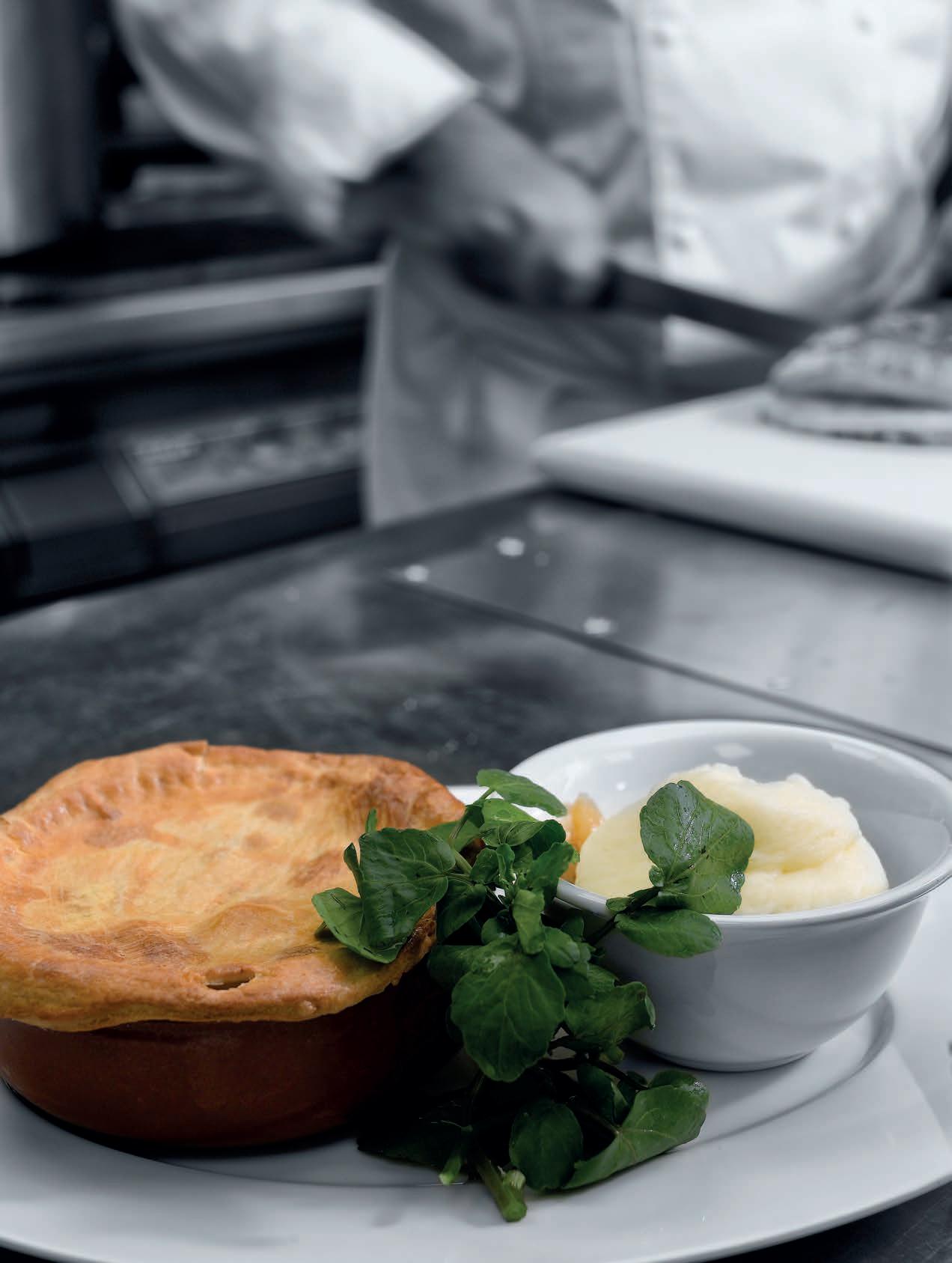A BREED APART
Pioneering dairy farmers say consumers want more ethically produced milk
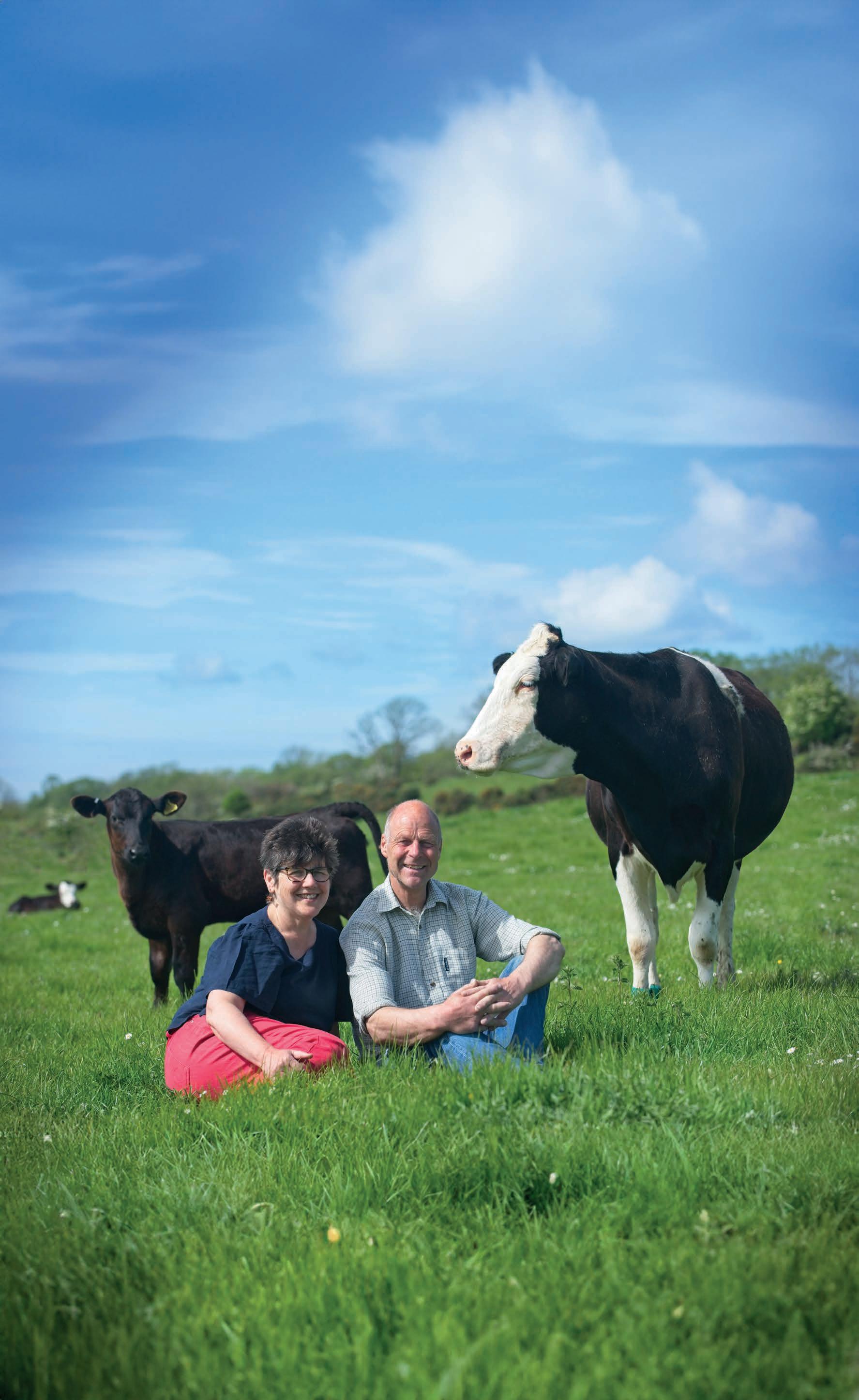
ROCKET MAN
Cambridgeshire farmer
James Peck has a bold plan for ‘big farming’
FARM POLICY
Defra Secretary Steve Reed unveils his vision for UK agriculture
FOOD & DRINK
A new way to dine with our combination menus for lunch and dinner

The Farmers Club
Serving the farming industry for over 180 years
3 Whitehall Court, London SW1A 2EL
T: +44 (0)20 7930 3557 E: generalo!ce@thefarmersclub.com W: www.thefarmersclub.com
Chairman 2025: Karen Mercer
Chief Executive & Club Secretary: Didi Wheeler
Reception
020 7930 3557 ext. 200 & 201 or option 2 reception@thefarmersclub.com
Restaurant Reservations
020 7930 3557 option 3 restaurant@thefarmersclub.com
Bedroom Reservations
020 7930 3557 ext. 204 or option 4 reservations@thefarmersclub.com
Conference & Banqueting
020 7925 7100 functions@thefarmersclub.com
Membership 020 7925 7094 membership@thefarmersclub.com
Member Experience
020 7930 3751 memexpmanager@thefarmersclub.com
Club Events
020 7930 3751 memexpcoordinator@thefarmersclub.com
Finance
020 7930 3557 ext. 221 or option 8 financialcontroller@thefarmersclub.com
General Office
020 7930 3751 generalo!ce@thefarmersclub.com
Instagram: @the_farmers_club
Facebook: The Farmers Club Page X/Twitter: @TheFarmersCub
The Farmers Club Journal
Designed, produced and published by Fenelon Publishing Limited on behalf of The Farmers Club
Cover photo by Ian Findlay
Disclaimer: Articles published in The Farmers Club Journal do not necessarily reflect the views of The Farmers Club. No responsibility for the quality of goods or services advertised in the Journal can be accepted by the publisher. Advertisements are included in good faith. All rights reserved.
4 Chair’s Comments
Karen Mercer outlines her plans for the year ahead at the Club
6 Club News
Our new season of Club activities puts a smile on everyone’s faces
9 Monday Lecture
Defra Secretary Steve Reed MP unveils his vision for farming 14 Rocket Man
Club member James Peck has bold plans for ‘big farming’ 19 Financial Wellbeing
How to plan your retirement
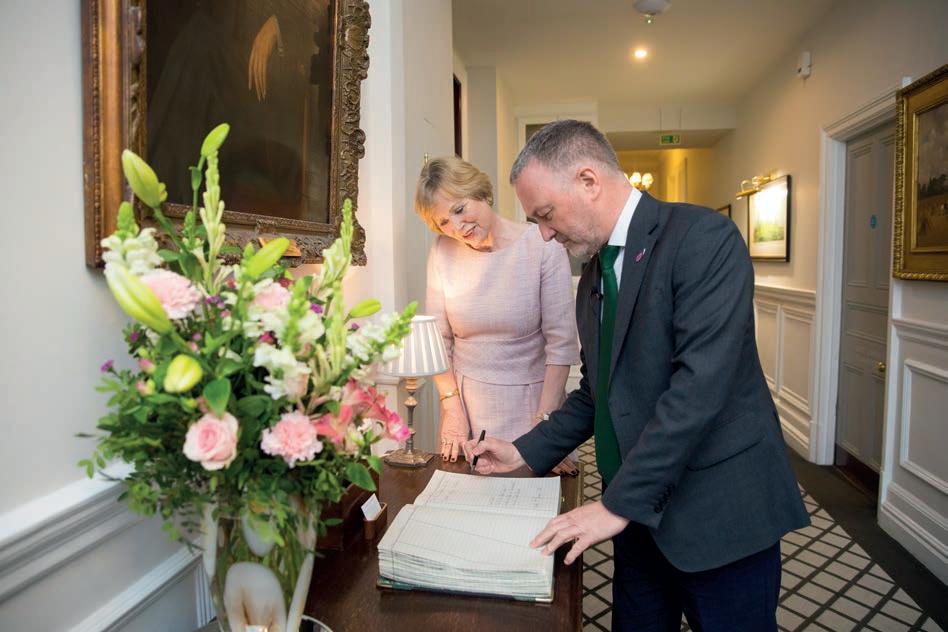
Land-based Careers Charity support for our veterans
21 Tariffs and Trump
What Donald Trump’s trade war means for UK agriculture
24 A Breed Apart
Pioneering farmers say consumers want more ethically produced milk 28 Kitchen Camaraderie
A new way to enjoy dining at the Club – and our Steak Festival

&
Five wines for all occasions this Spring at The Farmers Club
Planning Reform New opportunities for farmers
Tribute Former Club President and Chairman Peter Jackson CBE
& Country Club events for the months ahead
to apply for a trust grant
ff
CHAIRMAN’S COMMENTS
Karen Mercer
A busy start to the year
Welcome to your new-look Farmers Club Journal – celebrating the best of The Farmers Club and keeping members up-to-date with everything on offer – now and in the months ahead.
Conferences
It has been a busy start to the year. I have attended the Oxford Farming Conference, the LEAF Conference, LAMMA and the NFU Conference – two of those events to the sound of tractor horns blaring in the direction of Defra Secretary Steve Reed. At the NFU conference, Mr Reed said he was sorry for the upset over inheritance tax, but insisted it was a decision that had to be taken. He then promised to tackle the deep-rooted problems holding the sector back by ensuring farming becomes more profitable. This approach, he said, would underpin the government’s 25-year farming roadmap and its food strategy.
Farming future
The government strongly believes innovation and technology is the way forward. It says this will help farmers produce more food sustainably and more profitably – and argues that it will make a real difference to the bottom line in years to come.
But further announcements since then will have a huge effect on farming – the latest being the closure of the Sustainable Farming Incentive to new applications, with no sign of when it will reopen.
Like you, I await some positive government
action, rather than only words, that shows the government views farmers and farming as a priority.
Speaking to farmers, I know many of us are at a loss to know the right way to plan for the future and the steps to be taken. Uncertainty about the future within any business is a di!cult place to be.
Despite the complex agricultural scene, it has, however, been a good conference season with a host of inspiring speakers. Every day is a learning day.
The City Food and Drink Lecture, was held in London’s prestigious Guildhall. Keynote speaker John Shropshire, of G’s, spoke of the challenges facing farming’s future, the role of the family business and his commitment to management practices that conserve the Fenland soil. It truly was an excellent lecture.
Monday Evening Lecture
In January, Defra Secretary Steve Reed accepted our invitation to deliver a Monday Evening Lecture at the Club. After his speech, Mr Reed took a range of questions from Club members. We have a full report (see page 9) and I urge members to attend future lecture evenings. You certainly won’t regret it.
“The year to date has been extremely enjoyable and busy –and there is so much more to come.”
Social
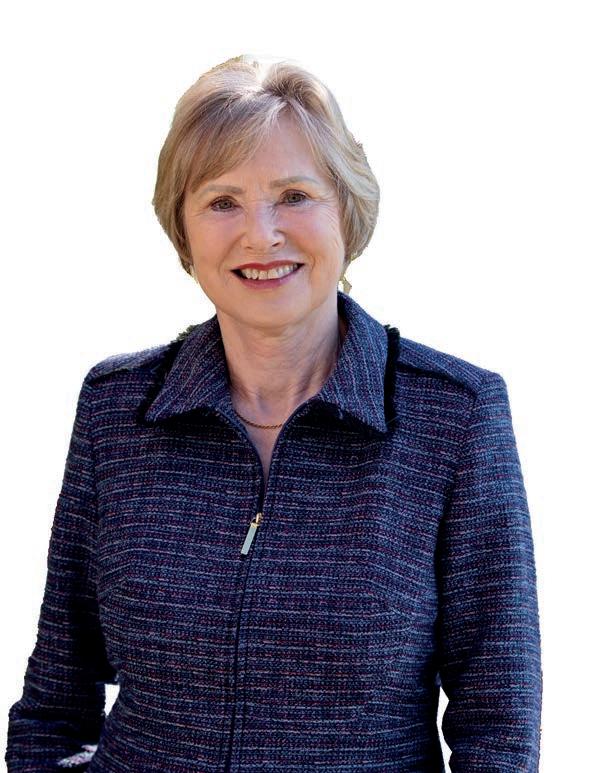
The Club’s inaugural Burns Night Dinner was a roaring success. Everyone entered into the spirit of the event, joining in with the singing. We had a fun-filled evening (see page 8). Many thanks to Jim Hulme who played a major role in the programme.
The Under 35s Dinner was a great success too, with guest speaker NFU President Tom Bradshaw. I was delighted to be invited and made very welcome. And what a great time we all had, especially when we ended the evening at The Piano Bar in Covent Garden. I hope I gave a good account of myself, as I stayed on the dance floor until 2.30am.
I was a guest at the Worshipful Company of Farmers Banquet, accompanied by my son Tom, and we made it to the top table. Principal speaker was former Defra Minister Sir Mark Spencer. As ever, HRH The Princess Royal gave a very knowledgeable and sensible summary speech.
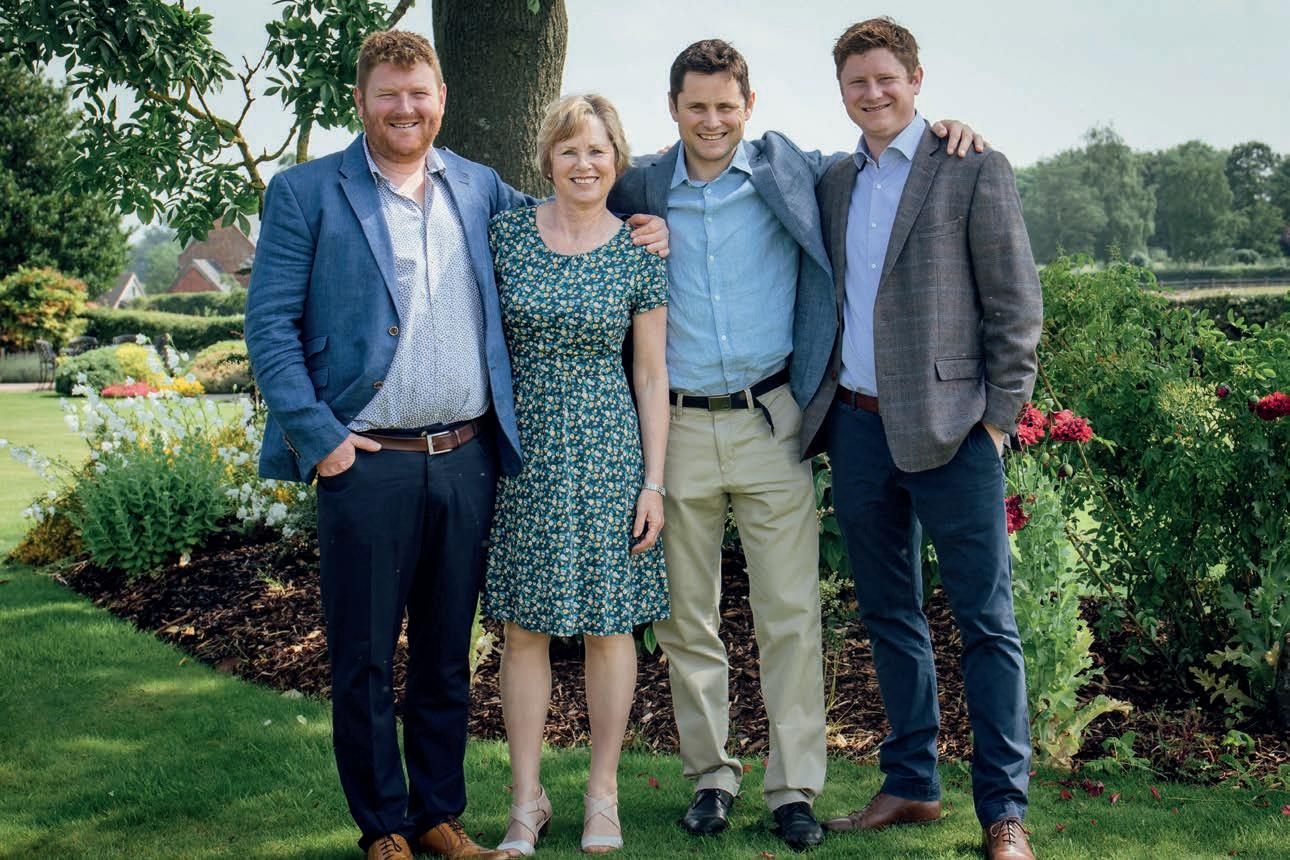
Club representatives and sharing with one another the challenges of clubland in today’s economic climate.
Educator awards
But it’s not all a social whirl. I was involved with the 2025 Agricultural Educator Awards. There were seven worthy candidates, all employed in agricultural education. The award enables them to widen and develop their own subject expertise in the UK or abroad. The gained knowledge is then imparted to their students and beyond.
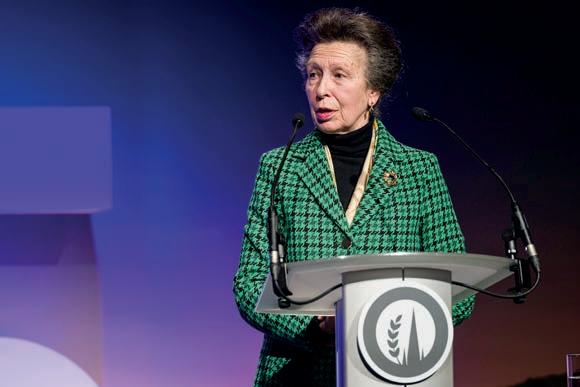
An important event that we held in March was our Ladies in Agriculture Dinner. More than 60 guests attended and not all ladies; some gents had a place at the table too. We had some pretty big names supporting the event – so no pressure!
The evening included me in conversation with Sarah Cowlrick and Sophie Dwerryhouse, both members of the Club committee. It was a great Q&A.
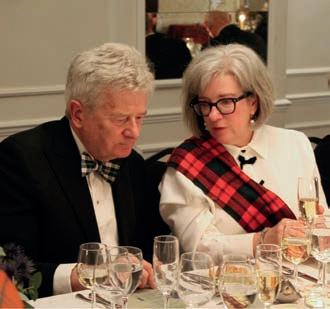
Above: A warm welcome awaits from Robert, Karen, Tom and Alec Mercer
Left: HRH The Princess Royal addresses the Oxford Farming Conference
Below: Our Burns Night Dinner
Looking forward
Plans are falling into place for the year ahead. It will include a Chairman’s Tour of Staffordshire, hosted by myself and my three sons Tom, Robert and Alec, as we welcome you to our home county.
You can find out more by turning to our new eight-page Town & Country events section (see page 34). There is a wide range of activities for you to enjoy – some social, some more business-focused, but all of them carefully chosen to be of special interest to Club members.
I hope that by the time you read this, you will have been able to turn down the heating as the weather warms and Spring arrives. In the fields surrounding my house, there is a flock of Herdwick ewes. I enjoy seeing their lambs skipping with the sun on their backs. Now that really is a sight which makes me smile.
Club supports our farmers

ISeasonal menus and a huge number of events and activities have put a smile on everyone’s faces, writes Club Secretary and Chief Executive Didi Wheeler
t has been non-stop these past few months – a heady mix of business and pleasure at your home from home in London.
We have hosted the Chairman’s Burns Night dinner and Under 35s Chairman’s Black Tie Dinner – and a Monday Evening Lecture with Defra Secretary Steve Reed.
We have supported members gathering for the NFU Conference in Westminster, run two visits to the Royal Hospital Chelsea and one to Sir John Soane’s Museum.
We have marvelled at Cirque du Soleil in the Royal Albert Hall, visited Newmarket – the home of horseracing – and joined Chairman Karen Mercer for our inaugural Women in Agriculture event.
The Chairman, U35s Chairman and I accepted an invitation from


John spoke about preparing to farm in 2040, with success. He is the
Your Club Calendar

There has been something for everyone at your Club. The Chairman’s Burns Night Dinner gathered 85 guests for an evening of Scottish celebration. This marked Karen Mercer’s first o!cial function as Club Chairman – and a full report can be seen overleaf on page 8.
Horseracing headquarters
Our visit to the home of horseracing in Newmarket included the 2,500-acre training ground of the Jockey Club Estate, where members were
first primary producer to give this prestigious lecture. It was – without doubt – one of the best lectures many members can remember.
Supporting farmers
The Club continued to support the farming community’s return to Whitehall. First, the impressive Tractor Rally, with an estimated 1500 tractors, parked in regimented rows between Parliament and Trafalgar Square. The Pancake Rally followed on Shrove Tuesday. These events have seen farmers and their families – and opposition
able to see some of the world’s top thoroughbreds and chat with trainers and caretakers.
The National Stud provided the opportunity to see three of the country’s top six stud stallions before visiting the National Horseracing Museum.
Women in Agriculture
The Club hosted a very successful Women in Agriculture panel discussion and dinner, with Chairman Karen Mercer leading the conversation with 65 members, including fellow Club committee members Sarah Cowlrick and Sophie Dwerryhouse.
The idea for this special event was conceived by one of the Club’s U35s members. It was an inspiring evening and a fitting celebration

politicians – take to the streets of London, calling for a fairer deal for growers and livestock producers.
Steak success
I am delighted that Chef Paul Hogben and our Kitchen Brigade continue to add variety and skill to our Restaurant Menus. Our seasonal à la carte menu changes monthly, while our combination menus change every other week, allowing much variety to choose from.
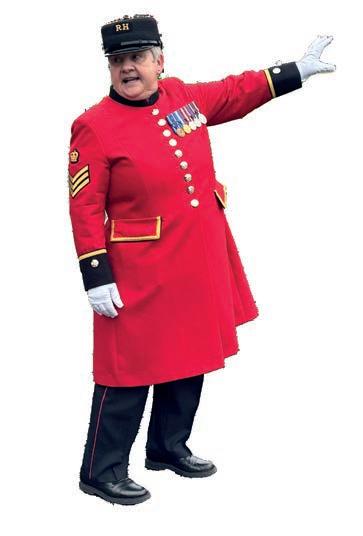
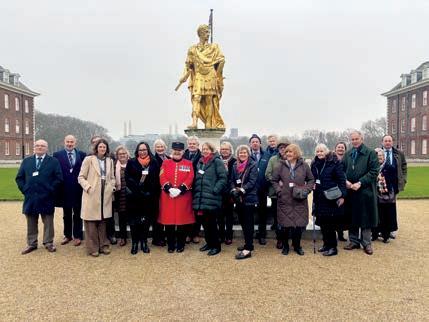
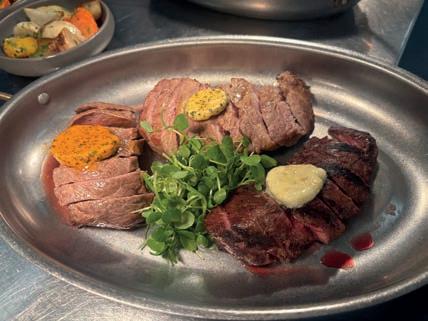
plans are for a Steak Festival from (see page 31), such has been the demand.
er a traditional roast with all the accompaniments for lunch or dinner, which requires just a minimum of 48 hours advance ordering. Our Summer Terrace menu launches on 9 June.
If something you fancy isn’t on the menu, please ask as we might be
quieter period after Easter. It is a calm time which some members and their families choose to spend at home – despite the considerable vibrancy that the May bank holidays offer here in London.
This means the Club still has plenty of bedroom availability in May – so there is a great opportunity to make the most of the 80th anniversary of VE Day commemorations in London from Bank Holiday Monday on 5 May to 8 May, as well as enjoying our regular Club events programme.
Business facilities
We recently upgraded the AudioVisual (AV) capability in all our function rooms. It is a giant step forward and will ensure that the Club can host more business meetings and gatherings.
Our recent Steak Week, with over 14 different steaks and side dishes, went down a storm. Current
of our women in agriculture. A full report will follow in the next issue of The Farmers Club Journal – and do watch this space for next year.
Fungi foray
Members met on Hampstead Heath with foraging expert and chef George Fredenham, who highlighted the plants and fungi he uses in his cooking – and how to forage responsibly and ethically. Members sampled fungi salt, Noble fir cone molasses, common hogweed, stinging nettle and wild garlic.
On return to the Club, dinner included an array of foraged wild ingredients and cocktails of bittersweet liqueur made from an infusion of beech leaves, refreshing lime leaves, redcurrants, bilberries, elderberries and damsons.
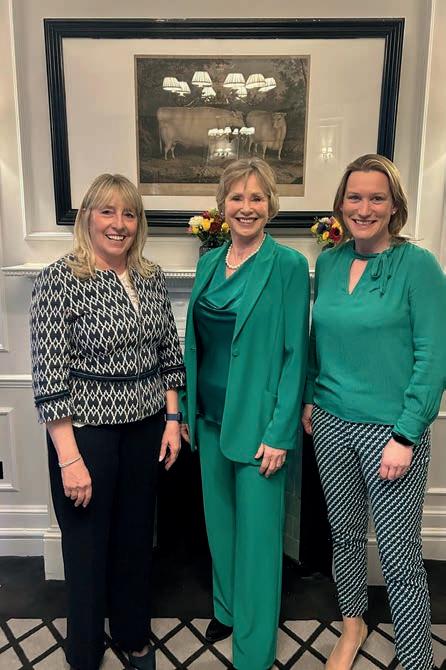
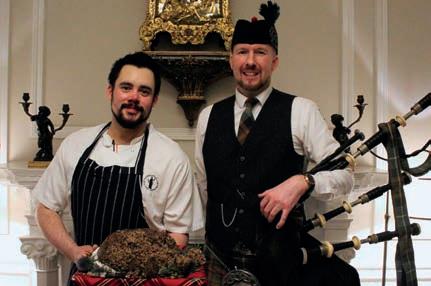
This online conferencing system – including screen, camera and microphones – integrates with Microsoft Teams and Zoom. We have an 86-inch screen in the Farmers’ Suite, and a 65-inch screen in the Club Room and the Committee Room for meetings. For details, contact the Club.
Left: (l-r) Sarah Cowlrick, Karen Mercer and Sophie Dwerryhouse; Below: The haggis is piped in at our Burns Night Dinner
Coming up…
Forthcoming Club events are previewed in our new Town & Country section, starting on page 34. In particular, I would like to highlight our busy season of Chairman’s Farm Visits, hosted by some of our very generous members, and the agricultural shows that we will attend this year.
This year I am looking for potential sponsors to support our show events, so if you are keen to support and be associated more closely with the Club at our events, please contact me at generalo!ce@ thefarmersclub.com.
Guests flock to inaugural Burns Night Dinner
More than 85 members and guests celebrated the enduring legacy of Scotland’s national poet, Robert Burns, when the Club hosted its inaugural Chairman’s Burns Night Dinner.
The evening marked Karen Mercer’s first o!cial function as Club Chairman, and her Scottish heritage added a personal touch to the occasion. The great bard’s poetry champions rural life and its deeply found ties to land and culture – values that still resonate with Club members today.
Celtic spirit
Members and guests arrived in black tie with many entering into the Celtic spirit by incorporating
Above (l-r):
Doug GodfreySwanney, Sarah Skerratt, Jim Hulme, Club Chairman
Karen Mercer and Matthew McRae
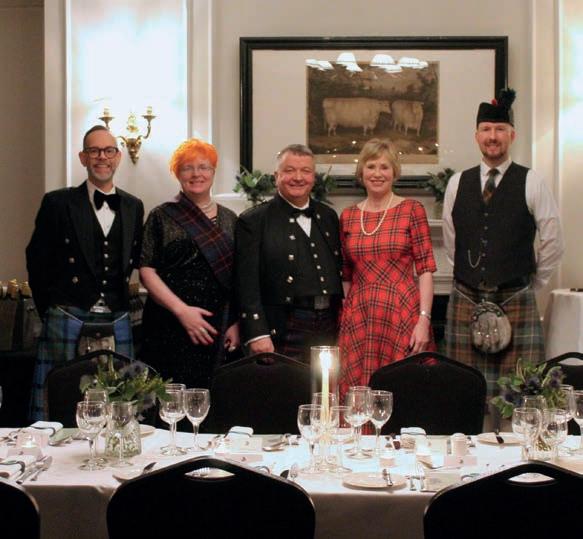
elegant tartan additions to their attire. We then processed into dinner to the stirring sound of Piper Matthew McRae. Karen offered a warm welcome and shared a few personal reflections on the significance of the traditional Burns Night celebration.
To a traditional fanfare, the Haggis was carried aloft by Chef Jack and piped past expectant diners. A lively and theatrical Address to the Haggis followed from Jim Hulme, before Karen led the traditional toast to the haggis.
Below: The Tartan Army at the Bar

Sublime feast
After the Selkirk Grace, members enjoyed a sublime Scottish feast. The evening included musical interludes and spoken tributes –each table holding a song sheet for members to join in with an array of Scottish songs, or simply immerse themselves in the music.
The first piece, My Heart is in the Highlands, was performed by the legendary Kenneth McKellar, whose rich and expressive voice captured the essence of Burns’ longing for Scotland’s natural beauty.
The Immortal Memory followed, delivered superbly by Doug Godfrey-Swanney. His rich and insightful tribute combined history, cultural identity and clever humour, in a thoughtful perspective on the life and influence of Robert Burns.
To follow, Ae Fond Kiss was performed by Scottish folk trio The
McCalmans. Karen explained the unfulfilled romance between Agnes (known as Nancy) and Burns, who said their final goodbye in 1791.
Agnes later attempted a reconciliation with her estranged husband in Jamaica, only to find he had taken a mistress. She returned to Scotland but never saw Burns again. It is said that every year in her diary on 6 December, Agnes wrote: “This day I will never forget, for this is the last day I saw Robert.” Agnes went to her grave at 83-years-old, in 1841 – some 50 years after she and Burns had said their goodbyes.
The mood was lightened with Jim Hulme’s amusing Toast to the Lassies – and witty riposte by Sarah Skerratt’s Reply of the Lassies.
Final tribute
The final evening song was Red, Red Rose, performed by Eddi Reader –a beautiful ballad about a deep and intense love.
The dinner concluded with the Chairman’s heartfelt thanks to all those who had made the evening such a success – but only after everyone joined hands for a rendition of Auld Lang Syne.
This inaugural event under our new Chairman was not only a celebration of Robert Burns and Scottish heritage – but also a powerful reflection of the Club’s community spirit. I suspect it will become a regular feature of the Club Calendar – do watch this space.

Unveiled: Government’s vision for farming
A three-pronged approach will secure a future for farming, says Defra Secretary Steve Reed. Johann Tasker reports
Defra Secretary Steve Reed outlined his vision for UK food and farming when he delivered the Club’s first Monday Evening Lecture of 2025.
A new partnership between the government and farmers was a key pledge when Mr Reed addressed a packed audience on Monday, 27 January.
“We are on the edge of an unprecedented global transition for farming,” Mr Reed told Club members and guests. Leaving the European Union and moving away from the Basic Payment Scheme was the biggest change for farming in generations.
Change is coming
At the same time, climate change meant farmers had to adjust to more frequent and severe flooding and droughts. Geopolitical events like war in Ukraine and Middle East unrest were also damaging global supply chains, causing costs to rise.
Acknowledging that changes announced in last autumn’s Budget – including to inheritance tax and national insurance – had added to uncertainty, Mr Reed said the government nonetheless wanted the sector to secure a successful future.
“We can only get there by working together in partnership,” he said. “Change is coming. We cannot ignore it. It’s best that we prepare for it.”
SOUNDBITES
“I want the farming sector to succeed –and we can only get there by working together in partnership.”
“Change is coming. We cannot ignore it. It’s best that we prepare for it.”
“The primary purpose of farming is – and always will be – to produce the food that feeds the nation.”
A three-pronged vision for farming – focusing on food production, profitability and environmental sustainability – would have food production at its core, added Mr Reed.
It would be accompanied by a renewed focus on the ability for farmers to diversify – and recognition that nature restoration is essential.
“The farming roadmap will be the most forwardlooking plan for farming in our country’s history,” he said. “It will make farming and food production sustainable and profitable for decades to come.”
The primary purpose of farming always would be to produce food for the nation, Mr Reed told listeners. But right now, too many farmers didn’t make enough money for the food they produce.
“If we are serious that food security is national security, then farming must be recognised as a serious business that needs to turn a decent profit if it is to be financially sustainable into the future.”
New deal
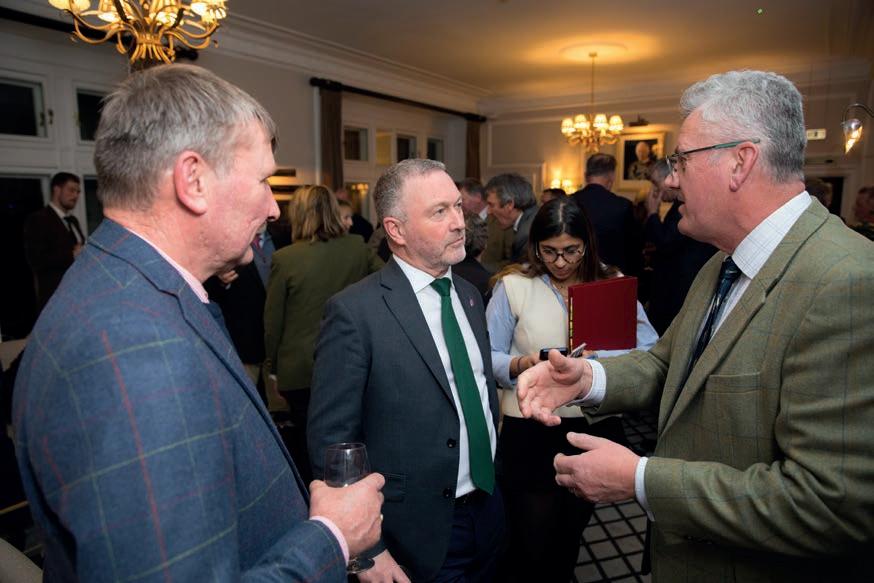
The government was also acting on supply chain fairness. New rules for the pig sector would ensure contracts set out expected volumes – and remedies when these volumes were not met.
“We are offering a new deal for farmers to help to ensure that’s what happens. Our new deal will also remove barriers to trade with a veterinary agreement with the European Union to get food exports moving across the border again.”
The government’s goal was for at least 50% of food served in hospitals, army bases and prisons to be local or produced to higher environmental standards, said Mr Reed. This meant British farmers would be well-placed to receive a bigger share of the £5bn spent by the public sector on food.
Contracts would include clear terms on pricing duration, termination processes and dispute resolution, said Mr Reed, with changes to contracts prohibited unless they were agreed mutually.
“Regulations for the milk sector are in place and regulations for eggs and fresh produce will follow. We’re working with all sectors to intervene where needed to guarantee fairness and ensure risks and rewards are spread evenly across the supply chain.”
Adopt fund
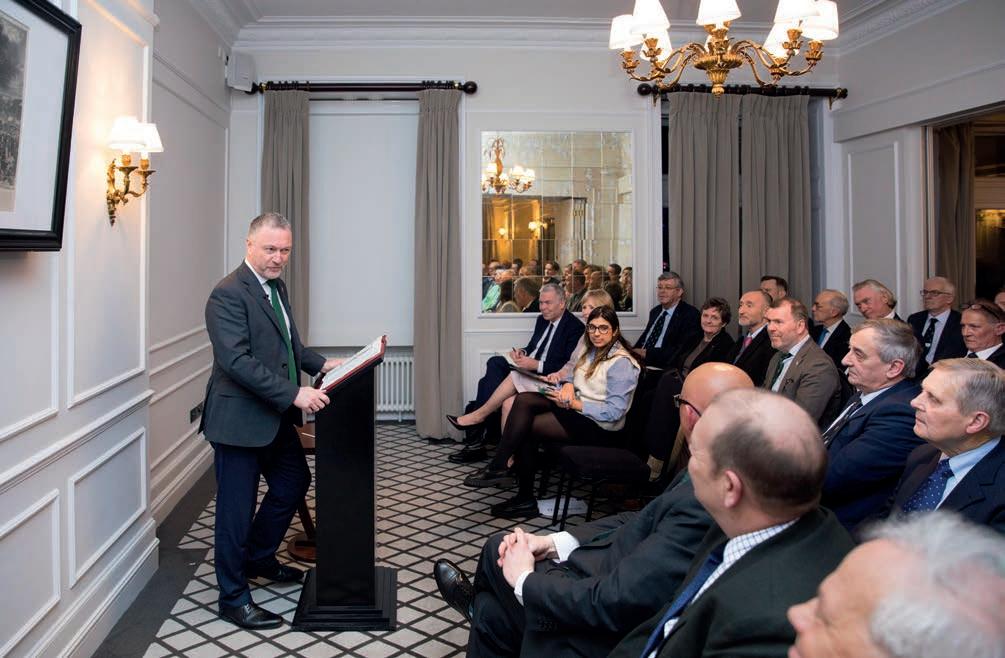
Launched this spring, the government’s Adopt fund would make it easier for farmers to take part in research – funding farmer-led trials to bridge the gap between new technologies and their real-world application in the field.

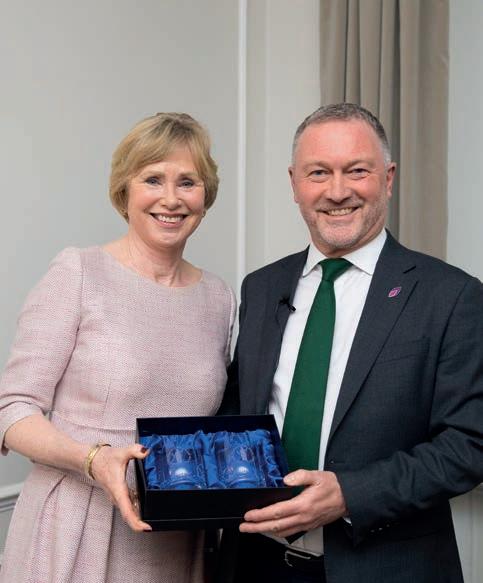
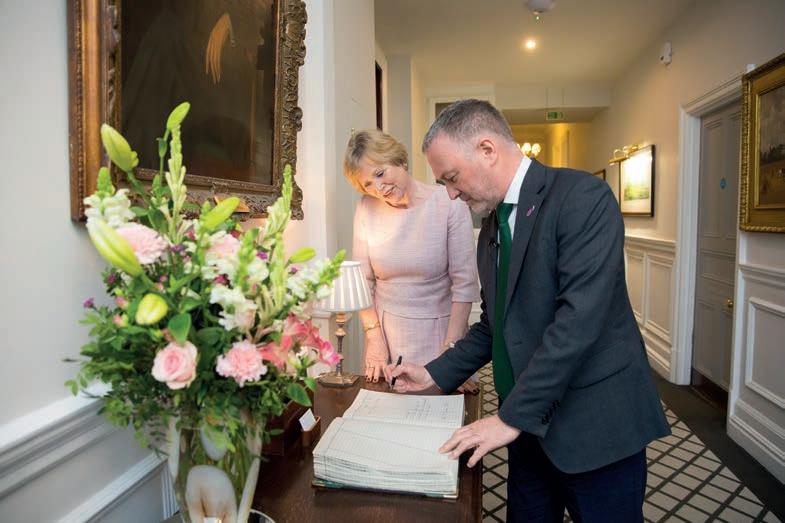
Precision breeding offered huge potential to transform the plant breeding sector, said Mr Reed. Secondary legislation would enable farmers to grow crops that were more nutritious, resistant to pests and disease and resilient to climate change.
To make the most of new business opportunities and ensure long term food security, farmers needed to cope with more severe and frequent flooding and drought – as well as other strains on water supplies.
The new Flood Resilience Task Force would ensure better coordination between government and its agencies – with faster funding to deliver new flood schemes and ensure money goes where it was most needed.
Refreshed approach
“We are delivering a refreshed approach to bolster England’s resilience to flooding and protect crops that are in the ground. We’re investing a record £2.4bn to build and maintain flood defences, with a further £50m for internal drainage boards.”
Repeating his assertion that food production would always be the primary purpose of farming, Mr Reed said farm businesses must be able to profit from other activities to stay viable in an increasingly uncertain world and to keep producing food.
To ensure this could happen, Mr Reed said planning reforms would encourage farmers to innovate and diversify, building business resilience so they could secure their future, even if there was a bad harvest or a disease outbreak.
“In the Spring, we will consult on national planning reforms to make it quicker for farmers to build the new farm buildings, barns and other infrastructure they need to boost food production.”
He added: “We will ensure permitted development rights work for farms, so they can convert larger barns into a farm shop or holiday let, or a sports facility.
“We will support farms to reduce water and air pollution through improved slurry stores or anaerobic digesters that can lower business costs and increase business resilience – or build small reservoirs to provide an extra water supply for irrigation.”
Mr Reed said he also wanted to make it easier for farm businesses to connect to the energy grid.
Vision for farming
Farming should have sustainable food production at its core – with nature restoration essential to achieving that goal, says Defra Secretary Steve Reed.
A ‘roadmap’ led by farmers will be developed this year – with the government and food producers working together to find solutions to the raft of challenges faced by the sector, he adds.
Mr Reed says his vision for the farming sector addresses the following key issues:
• Public procurement – At least 50% of food purchased by the public sector – including hospitals, prisons and schools – to be local or produced to British standards.
• Fair supply chains – Clear contracts and pricing terms are already in place for the pig sector, says Mr Reed. So too are regulations for the dairy sector. Agreements will follow for sectors such eggs and fresh produce.
Above (l to r): Steve Reed meets Club members; with Chairman Karen Mercer; and signing the visitors’ book
• Science & technology – The government’s Adopt fund will fund farmer-to-farmer trials to bridge the gap between new technologies and their application in the field –including precision-bred crops.
• Water management – The government is investing £2.4 billion to build and maintain flood defences, with a further £50m for internal drainage boards, which manage water levels for farming and environmental needs.
• Planning – A Spring consultation aims to speed up the planning process, making it easier for farmers to convert farm buildings, diversify and embark on projects that increase their business resilience.
• Nature restoration –Restoring nature is essential to food production, says Mr Reed, emphasising the importance of healthy soils, abundant pollinators, and clean water.
SOUNDBITES
“Restoring nature is essential, of course, to food production. It’s not in competition with it.”
“I know [inheritance tax] is a di cult change… but it’s something I think the sector can adapt to by taking the right advice.”
Small-scale energy projects, such as solar panels or wind turbines, offered farmers the chance to diversify their income and reduce their bills.
“Too many farm businesses and rural communities are left waiting far too long for a grid connection. We are working with Ofgem to cut the queue so we can free up capacity for electricity generation in rural areas.”
The national planning policy framework had been updated so applications for renewable or low carbon energy were more likely to be approved. An onshore wind task force was tackling barriers to small scale renewable energy on farms.
Red tape
To encourage investment in business resilience, farmers needed a clear framework, said Mr Reed. The current patchwork of regulations would be replaced by a more coherent system that was less time-consuming and easier to understand, he said.
“In our latest farm opinion tracker, only 28% of farmers fully understood the purpose of regulations that apply to their farm. There are over 150 pieces of legislation covering animal health and welfare and environment regulations alone.
“That may mean some rules have to change. Where that’s needed, I’ll ensure there is time to adapt. It requires Defra to keep our side of
Q&A
Farmers Club members quiz Defra Secretary Steve Reed
Jeremy Moody: How do you reconcile the decision to impose 20% inheritance tax on the sector with your commitment to increasing farm productivity and profitability?
Steve Reed: I’m absolutely committed to profitability. It’s quite shocking that farmers are putting so much effort into businesses that may not be making a profit – and there’s an awful lot more that government can do to support farms to make a profit.
We didn’t anticipate making the changes to inheritance tax – but we had to because of the scale of the black hole in public finances we inherited from the previous government.
the bargain too, and we are reviewing our own regulations and how we apply them to ensure they’re fit for purpose.”
Nature restoration
Restoring nature was essential to food security, said Mr Reed. Healthy soils, abundant pollinators and clean water were vital for sustainable food production – and the foundation for high crop yields, business turnover and profit.
“Without nature, we cannot have long term food security. That’s why we’re investing £5bn over the next two years in sustainable food production to help all farmers transition to more nature friendly farming methods.”
More than half of farmers had signed up to Defra’s farming schemes, said Mr Reed. “Through our upland farmers and tenancy forums, we’re working in partnership with the sector to design solutions for the specific challenges they face.”
Commitment
Underlining what he described as his cast-iron commitment to food production, more resilient farm businesses and nature restoration, Mr Reed said the farming roadmap would be led by farmers, rather than the government.
But the government would be very much
We couldn’t just go on the same way. I know it’s a di!cult change. It isn’t one that we anticipated making, but it is something I think the sector can adapt to by taking the right advice.
By speaking to those advisers about prudent succession planning, farmers and farm businesses can reduce their liability so they don’t have to pay anything more than they would need to pay.
Meurig Raymond: How can older and terminally ill farmers pass on a viable family farm without totally destroying that business in the process?
SR: Mercifully, circumstances like that are extremely rare.
I think it would be inappropriate for me as a Secretary of State to give individual people tax advice. But I’m sure they’ll be taking advice, as I’m sure anyone who owns a business they want to pass on will take advice.
But I don’t think confidence has been knocked simply by changes to inheritance tax. Confidence in this sector has been low
and declining for a very, very long time for a whole range of reasons, some of which I alluded to in my speech.
Philip Merrick: You mentioned diversification – but some farmers can’t diversify because their farms are designated Sites of Special Scientific Interest. What do you say to them?
SR: You raise very good point and we’re looking at the farming and protected landscape regulations as part of the road map. In the longer term, we will look at how we balance food production with nature restoration and other land uses.
George Dunn: What advice would you give to tenant farmers with landlords who won’t renew their tenancy because they now need the capital to pay inheritance tax.
SR: There are advantages and disadvantages within any change. You set out one scenario people might be facing, but there are also scenarios where there will potentially be opportunities for leaseholders to buy some of that land.
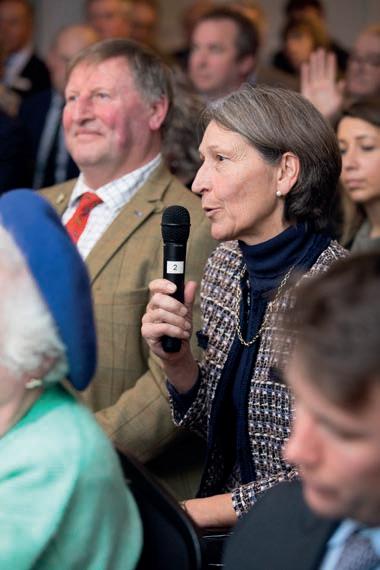
involved, he reiterated. “We will work with the farming community across all our schemes to evaluate what’s worked, what hasn’t and find out how we can make improvements.”
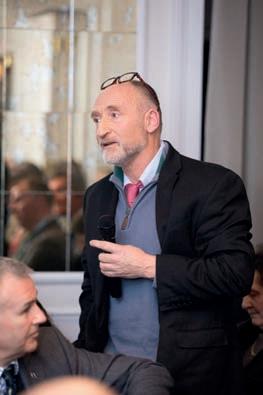
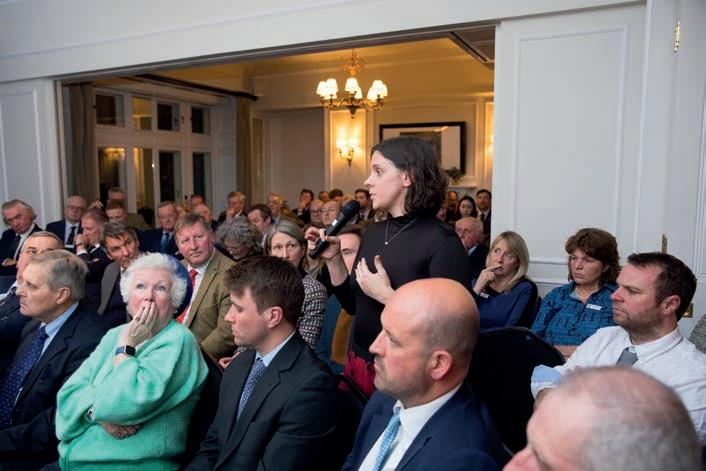
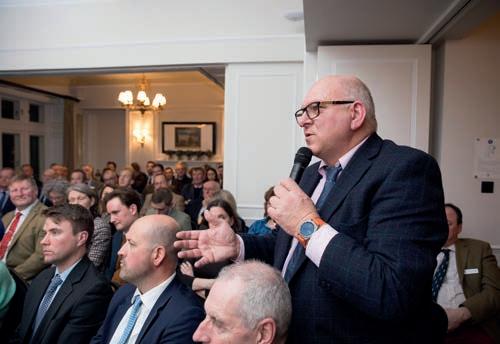
security, public health and the environment.
The forthcoming national land use strategy would keep the best farmland for food production; while a national food strategy would address food
Richard Morris: Why aren’t you doing more to encourage industry stakeholders to come together with retailers and food services to ensure the sector is more profitable?
SR: We’ve already started to make changes in some sectors within food production, but we need to look at the whole system and how the supply chain works so producers can make a profit. It’s entirely doable.
The reason I favour a collaborative approach is because the sector has much more experience and expertise than I do as a politician. So the sensible thing to do is to harness that experience, focus on the problem and find a solution.
Martin Williams: Do you really think in a cost of living crisis consumers can afford to pay more for food?
SR: Making farming more profitable doesn’t necessarily mean putting up consumer prices – especially in a cost of living crisis. It can be achieved by lower input costs.
“Farms deserve to be successful, profitable businesses. The path there won’t always be easy, but we will work together to get there – and the prize will be a farming sector that is more resilient financially as well as environmentally to face the future with confidence.”
Energy is one of the big costs. As well as fuel, it also influences fertiliser and pesticide costs. By generating more of our own clean energy, we can take back control of our farm energy costs, rather than being at the mercy of foreign dictators like Vladimir Putin.
Transitioning to more nature-positive models of farming – and using less fertiliser and fewer pesticides – will also reduce input costs. That will also help boost profitability. So too will improving supply chain fairness.
Sophie Dwerryhouse: What representation is Defra making to the Treasury over the need for a full consultation on inheritance tax and the impact on food productivity?
SR: You wouldn’t expect me to share confidential conversations that happen within government. No government would do that.
But I also don’t accept the point that inheritance tax will affect food productivity because if businesses take tax planning advice, they can minimise their liability.
Above: Questions came thick and fast after Steve Reed’s Monday Evening Lecture
What we’re doing through the roadmap is supporting farms to become more profitable in a way they haven’t been for a very long time. That will boost confidence in the sector. It will boost investment in the sector too – and that will boost food productivity as well.
Robert Brown: In the UK, we have about 32 producer groups representing about 43% of the UK’s fresh produce and vegetable growers. To compete with Europe’s 3400 producer groups, can you assure us that our producer organisation programme will continue?
SR: That decision is wrapped up with the spending review we are going through at the moment. But the approach I want is one of collaboration and co-production because the expertise is within the sector.
Organisations or groups or institutions that give the sector a voice are a very important point of engagement for Whitehall – so I completely hear what you’ve got to say there, and I’ll take the point back to government.
Rocket Man
Cambridgeshire farmer James Peck has bold plans for big agriculture
Agiant movie poster hangs on the wall behind the desk in the o!ce at Scotland Farm, Dry Drayton. It’s from The Rocketeer – a superhero film about a stunt pilot who discovers a jetpack that allows him to fly.
“Some friends gave it to me,” says James Peck. “They said it sums me up – always going onwards and upwards to the next big thing.”
James is managing director of PX Farms – a diversified arable business encompassing some 5,000ha (12,500 acres) across the four counties of Cambridgeshire, Bedfordshire, Hertfordshire and Lincolnshire.
Food production – in the form of combinable crops – is at the core of the business. But it also includes a haulage enterprise, almost 100,000 tonnes of crop storage and processing, rental properties and an successful YouTube channel.
This is the story of how a young farmer –and Farmers Club member – navigated family succession, financial constraint, and agricultural transition to build a stable and diverse business.
Roots
The Peck family history in business dates back to 1896 when James’ great-great-grandfather started a horse and cart haulage enterprise. Then, in 1918, his great-grandfather founded PX Transport after returning from the First World War.
Over the coming decades, PX Transport became a major haulage business. By 1950, the family had invested in agriculture, acquiring Scotland Farm, about six miles north-west of Cambridge.
The farm initially focused on livestock before shifting towards arable cropping in the 1980s, concentrating mainly on cereals and oilseed rape. James came on board at the turn of the millennium
– and thought he had a “job for life” until the challenge of family succession got in the way.
“In 2003, my father called me into a meeting and said he no longer wanted to farm. That was the moment everything changed. I had £1500 and a sports car, which I sold to raise capital.
“That was the start of PX Farms.”
Building foundations
Unable to afford land rental, James adopted a contract farming model. His father retained land ownership and financed inputs, while James managed operations, labour and marketing – sharing any profit. “I wanted to build it without relying on my father as guarantor. It was important to me that I did this independently.”
All photos throughout article by Jason Bye
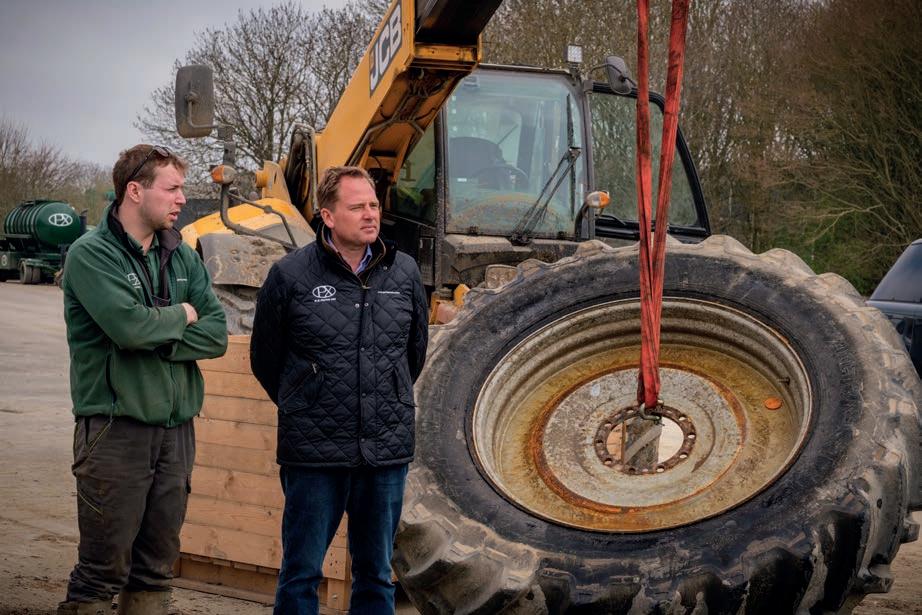

Visit the farm
James Peck will welcome members of The Farmers Club to Scotland Farm for a special visit on Tuesday, 24 June.
Visitors will be given a guided tour of the business which includes combinable crops, a haulage enterprise, almost 100,000 tonnes of crop storage capacity, a “crop hospital” with laboratory facility and a portfolio of rental properties and lettings.
The day is one of five Chairman’s Farm Visits taking place during 2025. The farms in question have been specially
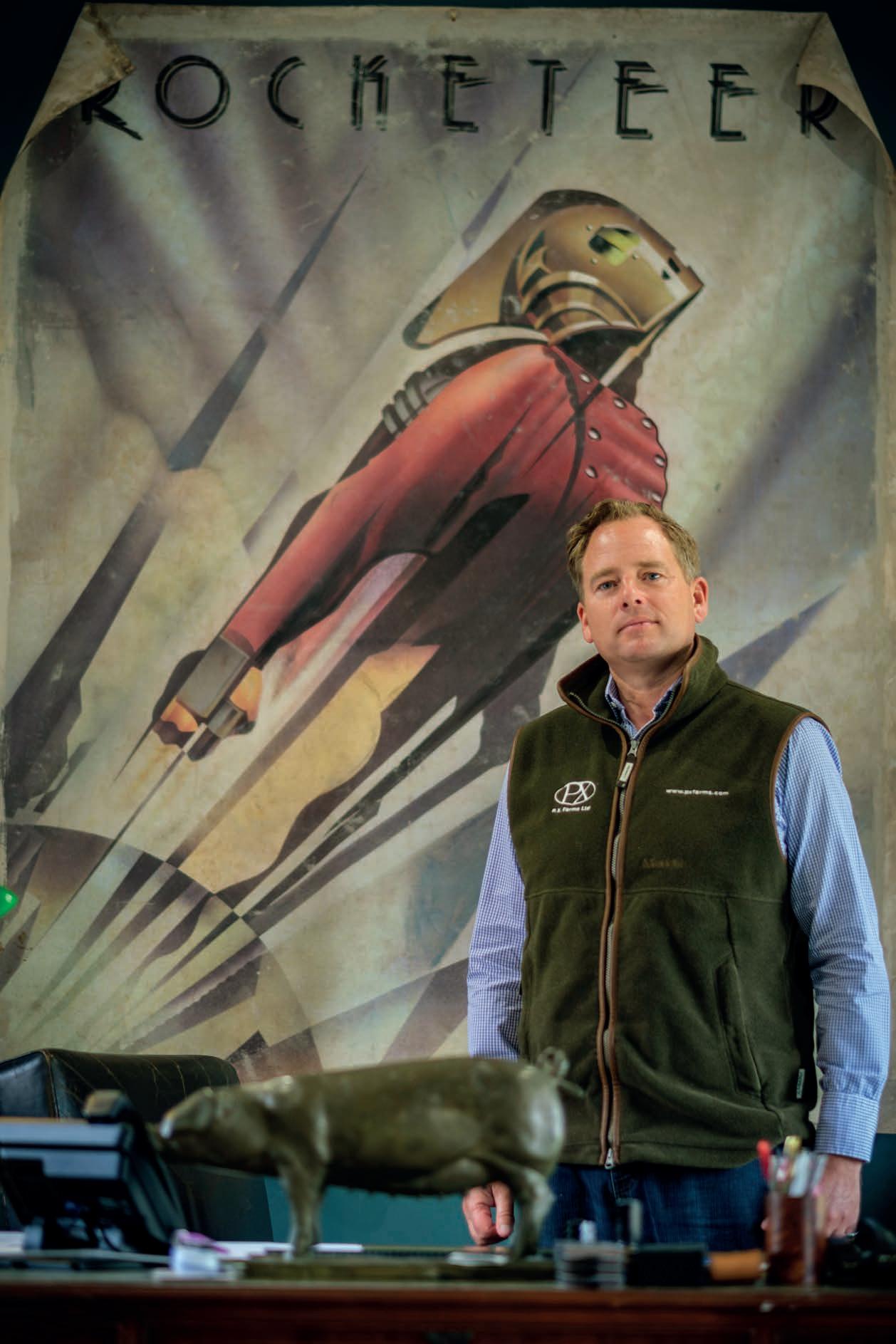
selected by Farmers Club Chairman Karen Mercer for the insight and innovation and they offer Club members. All successful family businesses, they encompass a range of different farming enterprises.
The visits aim to showcase the best of British farming –while providing Club members with an interesting, inspiring and informative day out.
For further details about the Chairman’s Farm Visits – and to book your place – please see our full programme on page 37.
Early on, he struggled. “I remember selling personal items, even CDs, to pay the bills. But it taught me prioritisation and business discipline.”
It was hard work. But breakthroughs came when he secured his first significant farming contracts. A 160ha (400 acre) farm provided initial scale, and another contract quickly brought the area under his management to 800ha (2,000 acres).
“That changed everything,” says James. “It meant the machinery was cost-effective, and the business became sustainable.”
Business expansion
Over the next two decades, James expanded PX Farms to include grain storage, haulage, property development, and renewable energy. The grain store now exceeds 100,000 tonnes of capacity.
“We built everything around the needs of the farm. The grain store allowed us to control our own logistics, quality, and timing.”
He also decided to diversify. PX Farms operates a fleet of lorries for internal and external haulage, maintains a grain cleaning and colour sorting facility, and has developed housing for staff
“We now have 19 houses and planning permission for three more,” says James. “These aren’t side ventures—they support the farm by solving workforce challenges and logistical needs.”
The focus on asset development has extended to converting disused buildings into o!ce and commercial space. “It made sense. Older farm buildings couldn’t accommodate modern machinery, so repurposing them added income and flexibility.”
Biography
James Peck studied at Lackham Agricultural College and Writtle Agricultural College (university) before setting up his contracting business in 2003.
Taking on the family farm under contract with PX Farms Ltd, he has since grown the business through a mixture of rentals, owned land, and contract farming agreements.
Today, most of the land is within an 18-mile radius of Scotland Farm, Cambridge, but there is also land 71 miles away in one direction and 34 miles in another.
Clockwise from top right: loading grain; James catches up with Kieran Robinson, the grain laboratory; the farm operates a fleet of Fendt tractors
James won the Farmers Weekly Firestone Young Farmer of the Year award in 2006. In 2010, he was awarded a prestigious Nu!eld Farming Scholarship to study the future of arable farming.
From 2010 to 2012, James was Chairman of Cambridgeshire and Bedfordshire Country Land and Business Associuation. Since 2013, he has been part of the Worshipful Company of Farmers.
He was also Chairman of the Henman Brooks Committee. He is a member of The Farmers Club.
It hasn’t all been plain sailing. A major setback saw a grain store collapsed due to structural faults. James had to rebuild it at personal cost. “We recovered some money through legal action, but it was a financial and emotional blow. Still, I learned the value of decisiveness. Make a decision – even a wrong one – and then move forward.”
That experience led James to apply for a Nu!eld Farming Scholarship in 2010. Despite initial hesitation due to dyslexia and public speaking anxiety, he was awarded the scholarship.
Mutual respect
“It changed my outlook. I travelled the world, studied farming models, and came back energised. In that year and a half, the business grew by 34%.”

Determined to make his own way in life, one of James’ long-term goals was to buy out his family and gain full ownership of the original farm. This process, spanning years of negotiation and planning, was achieved with mutual respect and minimal conflict.
“I didn’t inherit it. I bought it. That makes me proud. Everyone’s been looked after. My sister has a home and farm in Wales. My father has a secure income.”
The transition was facilitated by a shift in banking relationships. After years with a high street bank, James moved to C. Hoare & Co., a private bank offering a more responsive service. “It was the best decision. They understand our business model and are agile in decision-making.”
James also received strategic advice from longterm financial partners. “Gary Sallis, our bank manager, told me early on to start building assets. That advice helped create the foundation for long-
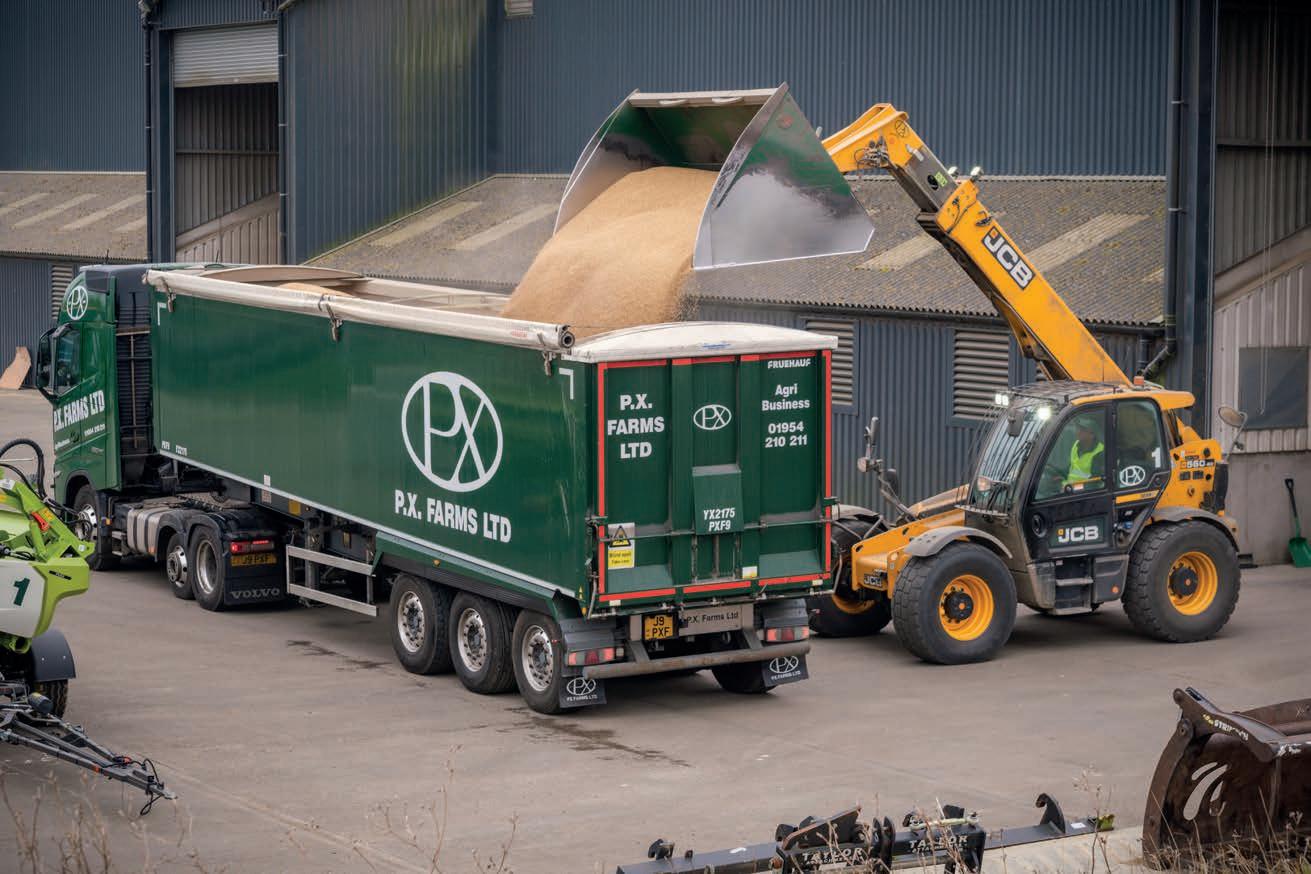

term borrowing and growth.”
That has seen the business grow far beyond its base – farming as far as 70 miles away. Despite the geographical spread, all operations are managed from Scotland Farm, says James.
“It may seem ine!cient, but it works. Centralising administration, o!ce work, grain storage and logistics allows us to operate leanly.”
That said, the company is a major employer locally. It employs 51 people, including 32 full-time staff – all closely involved with the business. James fosters a workplace culture based on teamwork and accountability.
“When I walk into the yard and everyone’s there, it’s joyful. I couldn’t go back to farming alone.”
Staff are incentivised with bonuses based on output and quality. “We recognise the effort it takes. People work hard, and they deserve to see that reflected.”
Job creation
Like many in UK agriculture, PX Farms has been hit hard by the phasing out of the Basic Payment Scheme – which has affected cashflow. “It’s a big hit. At our scale, it’s the equivalent of losing £1 million in income,” says James.
The government should recognise this, he argues. The scale of his business enables job creation and rural development. “Most farms employ three people or fewer, often just family. We’re providing >>
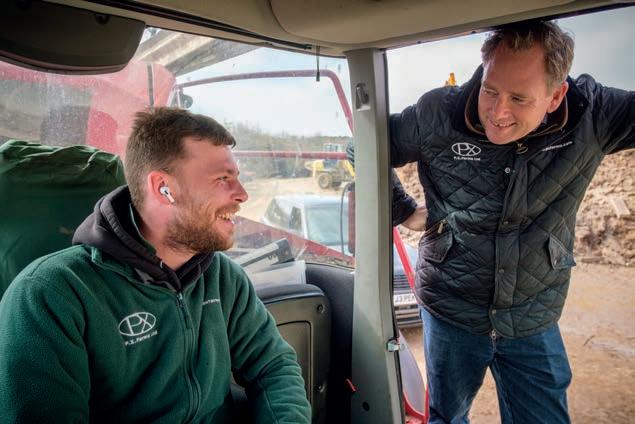
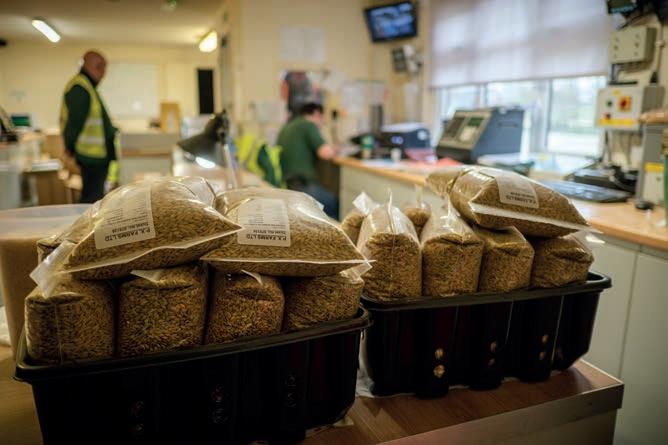
opportunities for dozens of people. That has value.”
To compensate, PX Farms has doubled down on e!ciency and service. By managing everything from transport to grain processing, the business captures more value at each stage.
“We benchmark ourselves regularly. If we’re not delivering value to our clients, they won’t stay.”
Farming philosophy
James sees farming as a foundation from which other business units grow. “Every diversification decision originates from a farming need. Whether it’s a house for a new employee or a grain cleaner to improve crop value, it all starts with the farm.”
This philosophy extends to how he works with landowners. “We never ask them to invest. We improve their asset with our own revenue. Their land increases in value, and they get an income.”
James credits his success to persistence and alignment. “The model works because it’s consistent. The land generates need, and that need justifies investment.”
More recent developments have included the launch of a YouTube channel documenting the dayto-day trials and tribulations of largescale farming. A growing fanbase means the channel has almost 22,000 subscribers.
Looking ahead
James remains enthusiastic about growth and innovation. “I love scale. Every new acre is a new challenge, a new chance to optimise.”
He believes that future opportunities lie in combining agriculture with service provision and asset management. PX Farms continues to explore
‘Food is our key role’
Finding the right balance between food production and environmental work is the key to successful farming, believes James Peck.
Pressure on farmers to produce high quality, affordable food while enhancing and protecting the environment can be a challenge, he says. But it is possible with careful management and attention to detail – despite ongoing uncertainty around government policy.
“The future of farming is twofold for me: it’s about supporting and working together through the
challenging times and celebrating the good times,” he says James.
“It’s also about combining scale for e!ciencies of economies and specialism to build value.”
For PX Farms, that means doing the best job possible while playing to the strengths of the business.
“We’ve decided as a business that we want to focus on growing crops. Producing food, that is our role in society. We do a lot of environmental work and regenerative agriculture. We need to find the right balance.”
additional housing, grain services, and logistics investments. “Our goal is to keep everything interconnected. That’s how we create resilience.”
As for his role, he still identifies first and foremost as a farmer rather than a businessman. Or perhaps both. “If I’m filling out a form, I write ‘farmer.’ But yes, I’m running a business. The two are not exclusive. “The evolution of PX Farms has been about balancing legacy with forward thinking, James adds. “We’re not just growing crops. We’re building systems that last.”
This approach, grounded in practical decisionmaking and collaborative relationships, will continue to define PX Farms as it navigates an ever-changing agricultural landscape, he concludes.

Below left and right: Haulage is a key part of the business at Scotland Farm
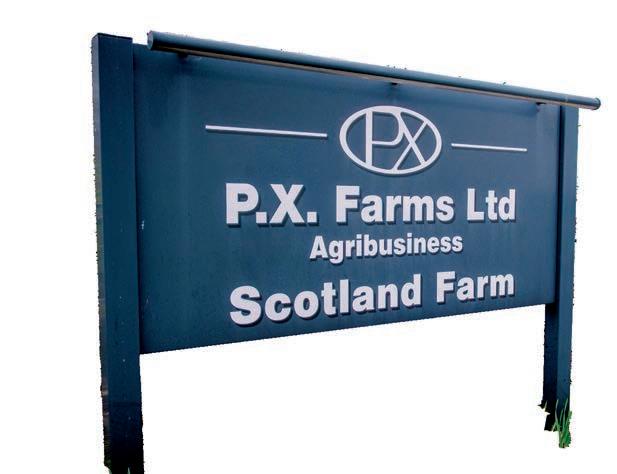
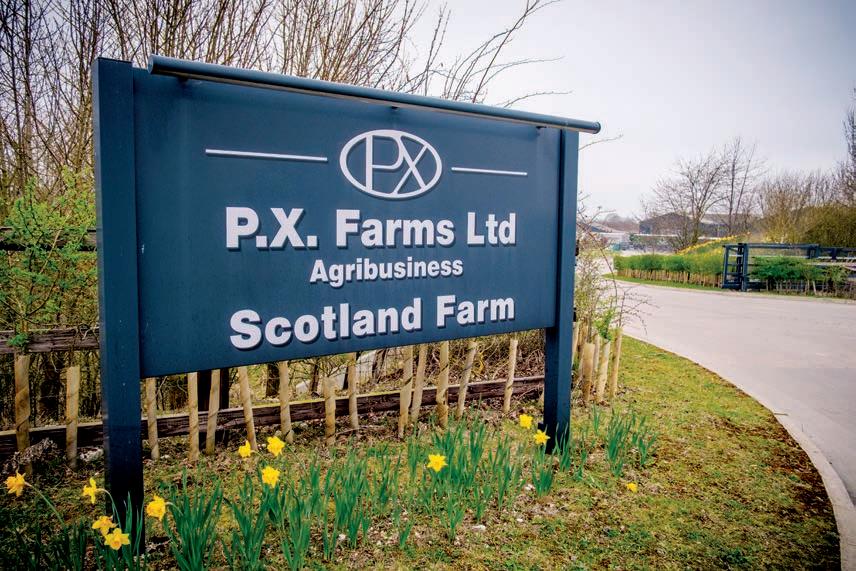
How to save for your retirement
Everyone needs a pension – and it’s never too late (or early) to start saving, writes Lawrence Davies
Apension isn’t a luxury or an afterthought – it’s an essential part of securing financial independence in retirement and should be part of everyone’s financial plan. Pensions are important because:
• Pensions offer security: Regardless of what happens to land values, a pension can provide a stable income in retirement.
• Stay in control: Unlike selling assets, pensions can let you grow your savings over time while maintaining ownership of the farm.
• Tax efficient: pension schemes are a tax-e!cient way to save for retirement. You get tax relief on the contributions.
• Flexibility: You can access pension savings from age 55, giving you control over how and when you transition from farming to retirement.
Options for younger farmers
If you’re a younger farmer, now is the best time to get your retirement savings on track. The earlier you start, the more


Lawrence Davies is country partnership manager for Wales at the Money & Pensions Service.
time your pension will have to grow. Here are some of the pension options that can help:
• Stakeholder Pension Plans: Simple, low-cost pensions are easy to set up, even if you’re just starting out or have an unpredictable income. Capped charges offer a default investment strategy –helpful if you don’t want to make investment decisions.
• Personal Pension Plans: A good choice if you want straightforward, low-maintenance savings. Charges and investment options offered by different pension companies vary, so it pays to shop around to get a personal pension that meets your needs.
• Self-Invested Personal Pensions (SIPPs): Similar to a standard personal pension but often with a much wider choice of investments – including agricultural land or property – so you stay connected to farm life while building your future. SIPPs can be complicated so you can choose to manage these yourself or with a financial adviser.
For older farmers: It’s never too late to plan
Older farmers who may have less time before retirement can still improve their financial security:
• Maximise contributions: Even if you haven’t set up a pension, making higher contributions to a pension over the next few years could build a more comfortable retirement. In fact, you can receive tax relief (free money!) on pension contributions up to the age of 75.
• Retirement lump sum: Farmers 55 or older can usually access their pension pots in various ways. This can be used to fund retirement or reinvest in other projects.
• Small Self-Administered Scheme (SSAS): For farmers who own a farm business, setting up a SSAS can sometimes allow the pension to be linked directly to the farm’s assets, including purchasing land, equipment – or funding the next generation to take over. Take-home messages:
• Start early: The earlier you start, the more time your pension will have to grow. Even small contributions add up.
• It’s never too late: Even if you’re approaching retirement, you can still save for retirement.
• Flexible options: From SIPPs to SSASs, there are pension options tailored to farming needs.
• Use expert resources: Use resources like MoneyHelper (see panel below). It can also help you find a regulated financial adviser.
Help on hand with MaPS and MoneyHelper
The government’s Money and Pensions Service (MaPS) offers free, impartial advice to for people of all ages plan for retirement and set up a pension. This includes the MaPS MoneyHelper service, which offers a range of free tools and resources to guide you through your options and budgeting
The MaPS Pension Calculator can

work out how much you’ll have in retirement based on your contributions.
Those over the age of 50 with a Defined Contribution pension can also arrange a Pension Wise appointment, either by booking a free one hour telephone appointment or using the MoneyHelper website.
For details, visit www.moneyhelper.org.uk
Charity gains ground for service leavers


FFarming and land-based careers are giving veterans the future they deserve, says Jamie Crisp
ormer service personnel are finding fulfilling careers in the land-based sector –thanks to a charity helping military veterans make a successful return to civilian life.
Called HighGround, the charity is named after the strategic importance of elevated terrain in military combat. It links people leaving the armed services with career opportunities on farms, in agriculture and other positions outdoors.
Farming, forestry and other landbased careers give service leavers a renewed sense of purpose and belonging, adds Jamie – helping those who served our country to thrive in their next mission, while benefiting rural businesses too.
Invaluable
“Transitioning from the military was daunting – but the support from HighGround was invaluable,” says Jonny Kerr a retired Black Watch
confidence to inspire others in the land-based sector and the role I took with farm management company Velcourt was amazing.”
Land-based careers are a particular good fit for service leavers because both sectors require similar skills. They both involve working outdoors in all weathers, dedication and a determination to see the job through – often in di!cult circumstances.
“Farming has been great for me, I can genuinely say the skills I learned in the army were entirely transferable to working in agriculture,” says Jonny. “I have to manage people, logistics and it’s outdoors –it has all the variety of the job I had in the army.”
Pathways
Because no two services leavers are the same, HigherGround offers two distinct residential pathways to a rural career. It is also working with land-based employers to ensure
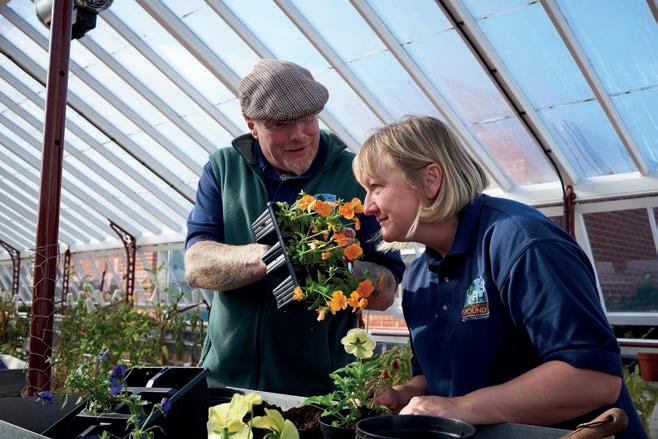
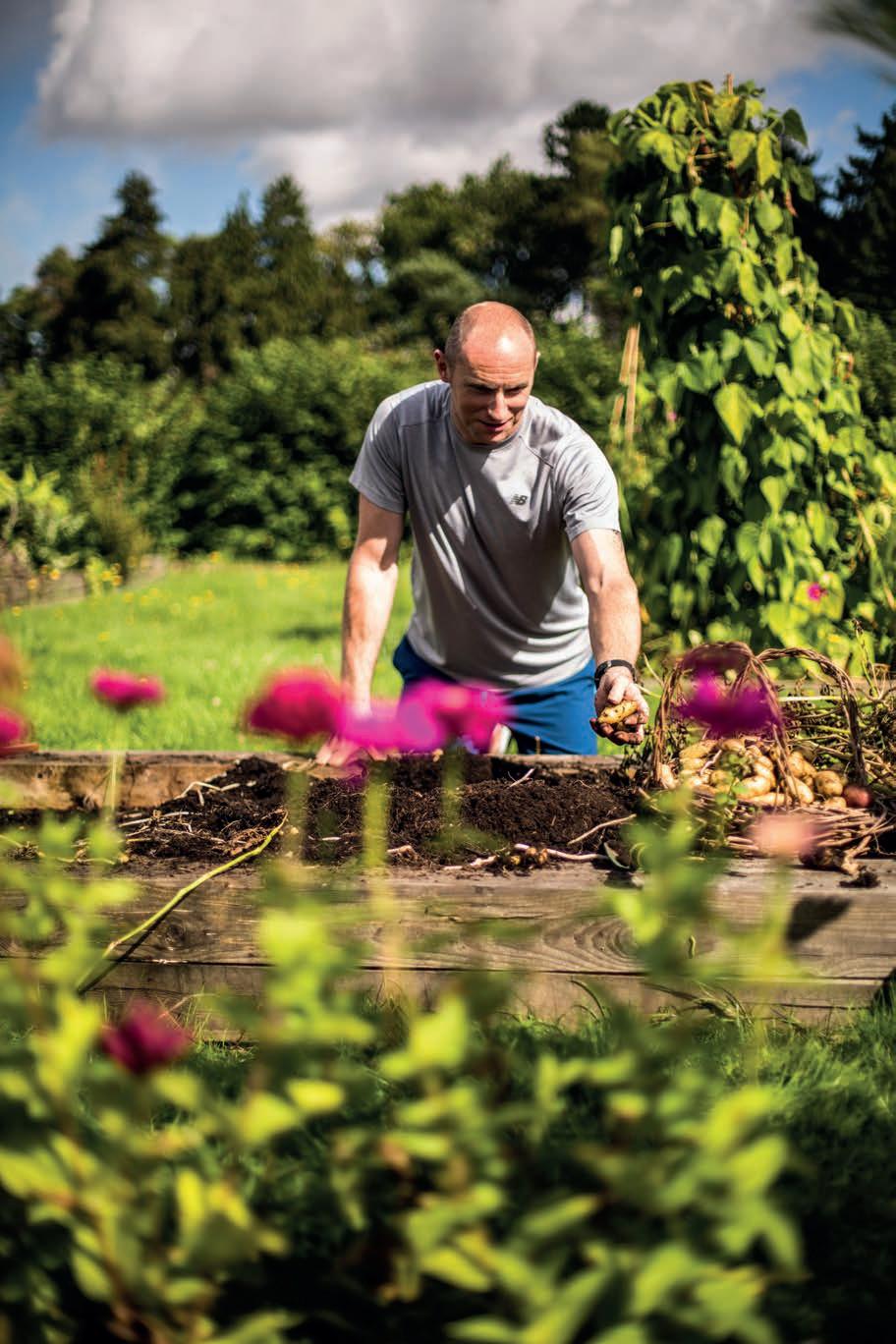
“
Farming has been great for me”
How to get involved
To find out more about getting involved, visit www.highground-uk.org.
To engage with HighGround chief execeutive Jamie Crisp, email Farmers Club Secretary Didi Wheeler at generalo!ce@ thefarmersclub.com.
Unlocking opportunities
HighGround is also partnering with Sparsholt and Bicton Colleges to offer a two-year programme leading to teaching qualifications, opening doors for female veterans to pass on their skills to the next generation.
“The opportunities are vast –whether it’s agriculture, estate management, forestry, arboriculture, heritage skills or conservation,” says HighGround chief executive Jamie Crisp. “We’re here to help unlock them,” he adds.

TARIFFS TRUMP & TRADE
Donald Trump’s second stint in the White House has big implications for UK farmers, writes Alex Hall >>
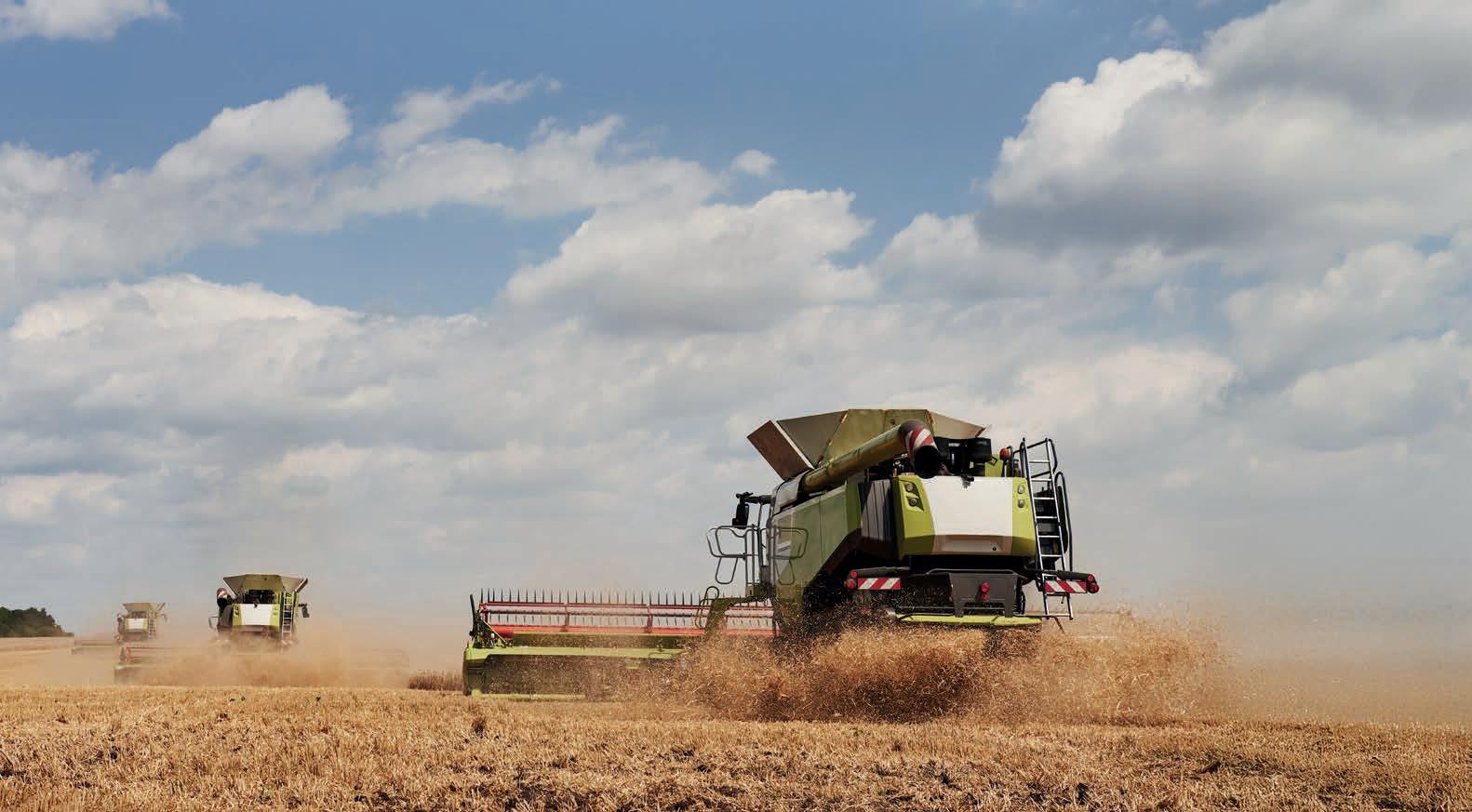

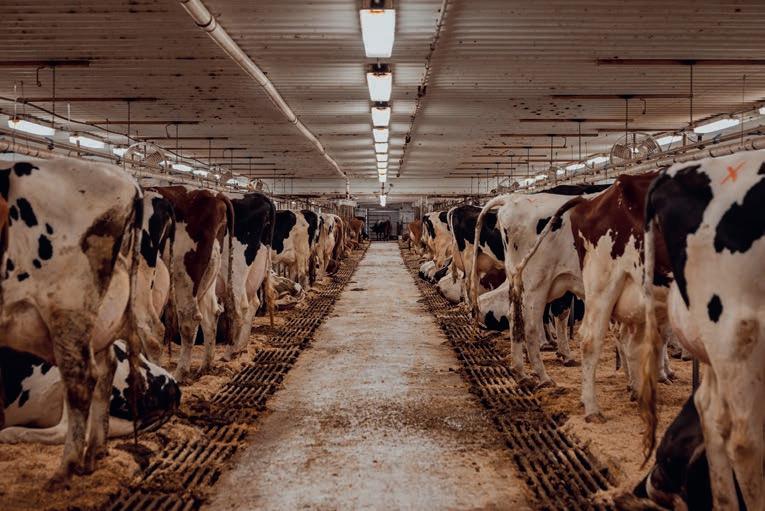

About the author: Alex Hall is a Farmers Club U35s member and partner at farm business consultants Ceres Rural.
Protectionism, regulation and climate change denial: there’s little doubt Donald Trump has farmers the world over on the edge of their tractor seats.
With his second stint in the White House well and truly under way, President’s Trump’s aggressive approach to trade has been ringing alarm bells in the food and farming sector at home and abroad. After all, agriculture is where some of the first shockwaves from his America First focus are being felt.
The President’s decision to impose swingeing import tariffs on everything from automobiles to whisky has plunged global markets into turmoil Previous relationships with other countries – and conventional economic thinking – have counted for for little in his bid to reduce the USA’s trade deficit and prioritise American interests.
US Turbulence
American growers and livestock producers are not immune to the turbulence, with President Trump acknowledging the impact his policies will have on his own farmers – telling them to expect an adjustment period and bear with him.
Many remember the $23 billion in aid payments Washington was forced to distribute to American ranchers and growers during President Trump’s first administration, following the trade war that quickly developed with China.
This time, as he ratchets up the tariffs charged on products coming into the States, the move is already causing other countries to retaliate.
It’s not just tariffs. federal funding on programmes and grants has been paused and environmental protections rolled back – all moves UK farmers can empathise with.
Uncertainty
Whether it’s trade disputes, funding freezes or the almost daily changes of direction on policy, the biggest impact of the Trump presidency so far on agriculture worldwide is uncertainty.
Uncertainty is a problem because it causes business owners to rein back and sit on their hands. And if you’re standing still, your business is most likely going backwards. By their nature, global markets connect us all. So President Trump’s unpredictability has uncertain implications for us all – including UK farmers.
What we do know for sure is that President Trump likes to see himself as a tough negotiator, fuelling fears that any US-UK trade agreement could disadvantage British farmers.
The UK farming industry has always been wary of opening the door to US imports produced to lower standards, wanting to protect its food safety, animal welfare and environmental credentials and maintain its global supply chains.

Plan to put America’s farmers first
US Agriculture Secretary Brooke Rollins (pictured right) has focused on e ciency and prosperous farming since coming into o ce in February.
Raised on a farm, Ms Rollins studied agricultural development at Texas A&M University. She is the second woman to hold the position of US Agriculture Secretary – after Ann Veneman, who served under George W Bush in the early 2000s.
“President Trump promised to return power to the American people and inaugurate a golden age of prosperity,” she says. “No one deserves that more than America’s farmers and ranchers.”
Insisting that “food security is national
security” – a line also used by UK Defra Secretary Steve Reed – Ms Rollins says “putting American first” is bringing costs down for farmers, including for egg producers, who have seen prices soar.
“No-one has the farmer’s back more than President Trump,” she says.
Getting American food and farm products out into new world markets will mean more prosperity than American farmers have ever seen, adds Ms Rollins.
Underlining her commitment to working with Congress to get a new five-year farm bill across the finish line this year, Ms Rollins says doing so will “provide farmers the certainty they need to plan for the future.”

This is especially relevant to the livestock and poultry industries. Both these sectors are heavily subsidised in the USA.
The USA also has the advantage of scale, genetically modified crops, feed additives and hormones – many of which are banned in the UKmaking competing with US farmers in a free market a frightening prospect.
“There are lessons to be learned from the last time President Trump was in
office.”
While the UK government has repeatedly ruled out striking any trade deals that would undermine UK food standards, it is continuing to face mounting pressure to weaken its demands to secure an agreement that avoids even higher tariffs.
Balancing act
It’s a complex balancing act. British growers and livestock producers must adapt to changing global trade dynamics as best they can – while recognising the potential competition from American exports and the damage that might cause.
There are lessons to be learned from the last time President Trump was in o!ce, particularly in the areas of trade, policy and international relations.
Back then, the Trump administration supported the UK’s decision to leave the EU, creating a unique position for UK agriculture. During the first Trump presidency, the US imposed tariffs on certain EU products and agricultural goods – but the UK was not involved because of Brexit.
In fact, we were able to negotiate our own trade terms with the US, which in some cases actually benefited agricultural exports.
In 2019, the two countries discussed the possibility of a free trade agreement. That’s when the potential for bringing in products with inferior standards was recognised and became a bone of contention, which is still to be resolved.
President Trump also rolled back many environmental regulations in the USA, just as he is doing this time too. That includes Washington’s Net Zero obligations and opting out of the Paris agreement to reduce greenhouse gas emissions from agriculture and other industries.
As he withdraws from climate agreements and prioritises fossil fuel production, the divide between the US and the UK on their attitude to climatefriendly projects deepens.
In his first term, the impact of President Trump’s policies on UK agriculture was limited. But that doesn’t mean the same will happen this time and we have to hope we don’t see any further economic hardship in the farming sector.
Market volatility
The impact on grain markets depends on which countries President Trump continues to target with tariffs – and by how much. Significantly, for example, tariffs imposed on China in 2019 did not include agricultural goods such as wheat, maize and soyabeans. This time, it’s already different.
President Trump’s intention to apply 20% tariffs on the European Union could affect US maize exports. The EU is the USA’s second largest destination for maize, just behind Ukraine.
A peace deal brokered between Russia and the Ukraine continues to be elusive and is unlikely to have such an impact. Grain shipments have been largely unhindered and both countries have very little left to export this season.
But the fertiliser market is at risk. Canada leads the world in potash exports and accounts for over 41% of trade – with the US being a leading destination. That potash is mined in Saskatchewan –and then transported via rail into the USA.
Growing interest among consumers in food and farming is prompting more dairy farmers to produce milk from cows left with their calves.
A small but increasing number of farmers are adopting a “cow-calf contact” system of milk production in response to consumer demand.
Based in southwest Scotland, the Ethical Dairy has developed a model of dairy farming focused on animal welfare, environmental sustainability, and transparent production methods.
Founded by David and Wilma Finlay at Rainton Farm in Dumfries & Galloway, the Ethical Dairy takes a distinctive approach to dairy operations. Rather than pursuing volume-driven, large-scale outputs, the business centres its strategy on reducing ecological impact and increasing public trust in farming practices.
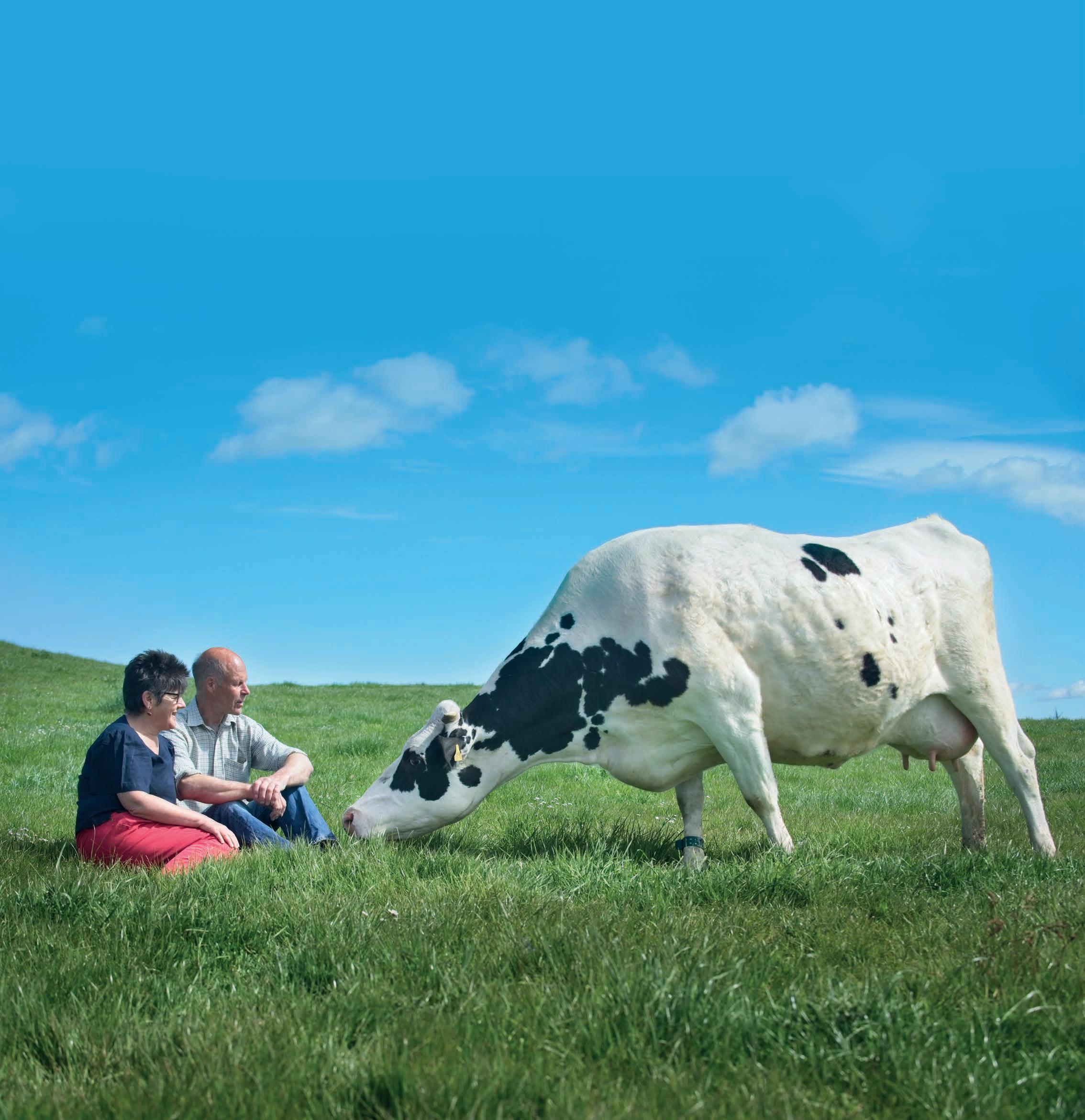
A core element is the Ethical Dairy’s calf-at-foot policy, where calves are kept with their mothers for the first five or six months of life – differing from standard dairy practice where calves are typically removed within 24-72 hours.
How it works
Cow-calf contact is a management approach that allows calves to remain with their mothers for an extended period after birth rather than being separated shortly after birth, as is usual in conventional dairy operations.
The practice promotes natural maternal behaviours, encourages bonding and can reduce stress for both cow and calf. Additionally, calves benefit from access to natural milk and maternal care, which practitioners believe may support immune development and growth.
A breed
Pioneering dairy farmers say demand is growing for ethically sourced milk
apart
But there are trade-offs. Extended cow-calf contact can result in lower saleable milk yield since calves consume milk that could typically otherwise be marketed. It may also necessitate changes in herd management, requiring modifications to milking routines and increased labour.
Moreover, there are challenges in balancing animal welfare with economic e!ciency. Despite increasing interest among both producers and consumers, cow-calf contact remains an evolving practice in the dairy sector, with proponents emphasising its welfare benefits and some critics pointing to its impact on productivity.
Calf-at-foot system

and operational sustainability.
Maintaining the calves with their mothers reduces milk yield for sale but addresses consumer concerns about animal separation, explains David. But the system has required changes in herd management, milk handling, and housing arrangements, he adds.
That said, David maintains that while it presents challenges, particularly in early implementation, cow-calf contact can be stable and functional when carefully managed.
The Ethical Dairy operates on organic, 100% pasture-fed and regenerative agricultural principles, focusing on improving soil health, increasing biodiversity, and minimising external inputs. Cows graze on permanent pasture most of the year. During winter months, they are housed and fed homegrown forage rather than imported feeds.
The Finlays introduced their cow-calf contact model in 2016 following a trial in 2012, seeking a system that would align with both welfare considerations >>
Project to encourage cow-calf systems
A ground-breaking project aims to encourage more dairy farmers to adopt cow-calf contact systems.
Transform DairyNet is an EUfunded initiative for dairy producers to learn from farmers who have already adopted systems where calves stay with their mothers, promoting natural behaviour, animal health and welfare.
The project’s goal is to find out what works and what doesn’t when it comes to cow-calf contact systems – and to popularise profitable and sustainable cow-calf dairy farming.
Coordinated by Professor Siobhan Mullan, of University College Dublin, the project is also establishing an international network of practitioners.
The Royal Agricultural University (RAU) is a partner in the project – and has appointed Farmers Club committee member Sue Bullock as
Below: Cows and calves are pasture-fed
its Transform DairyNet facilitator. Sue joins more than 25 other organisations from 14 different countries in the project to allow dairy calves to spend longer with their mothers.
“The RAU has led the set-up of 11 National Innovation Practice Hubs and a European Knowledge and Innovation Network to share existing knowledge across borders,” explains Sue.
“The idea is that farmers and other industry practitioners will benefit as everyone shares their experiences,” she adds.
Special practice hubs will undertake trials in participating countries in a bid to fill any knowledge gaps – and support new cow-contact systems.
For more information, please email susan.bullock@rau.ac.uk or visit the project website transformdairynet.eu.
The farm has improved its self-su!ciency by growing its own silage and avoiding synthetic fertilisers or routine antibiotics. These practices are consistent with a broader industry shift toward methods that prioritise both sustainability and longterm business resilience.
The Ethical Dairy’s direct-to-consumer business model is proving popular. Most milk is processed onsite into cheese sold through the company’s website, farm shop and select retailers. Surplus milk is sold through an organic co-op.
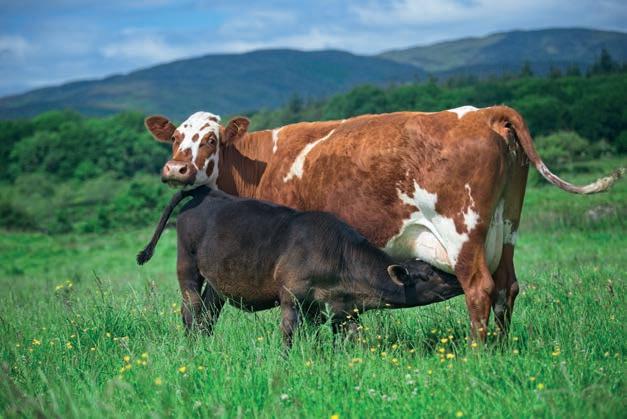
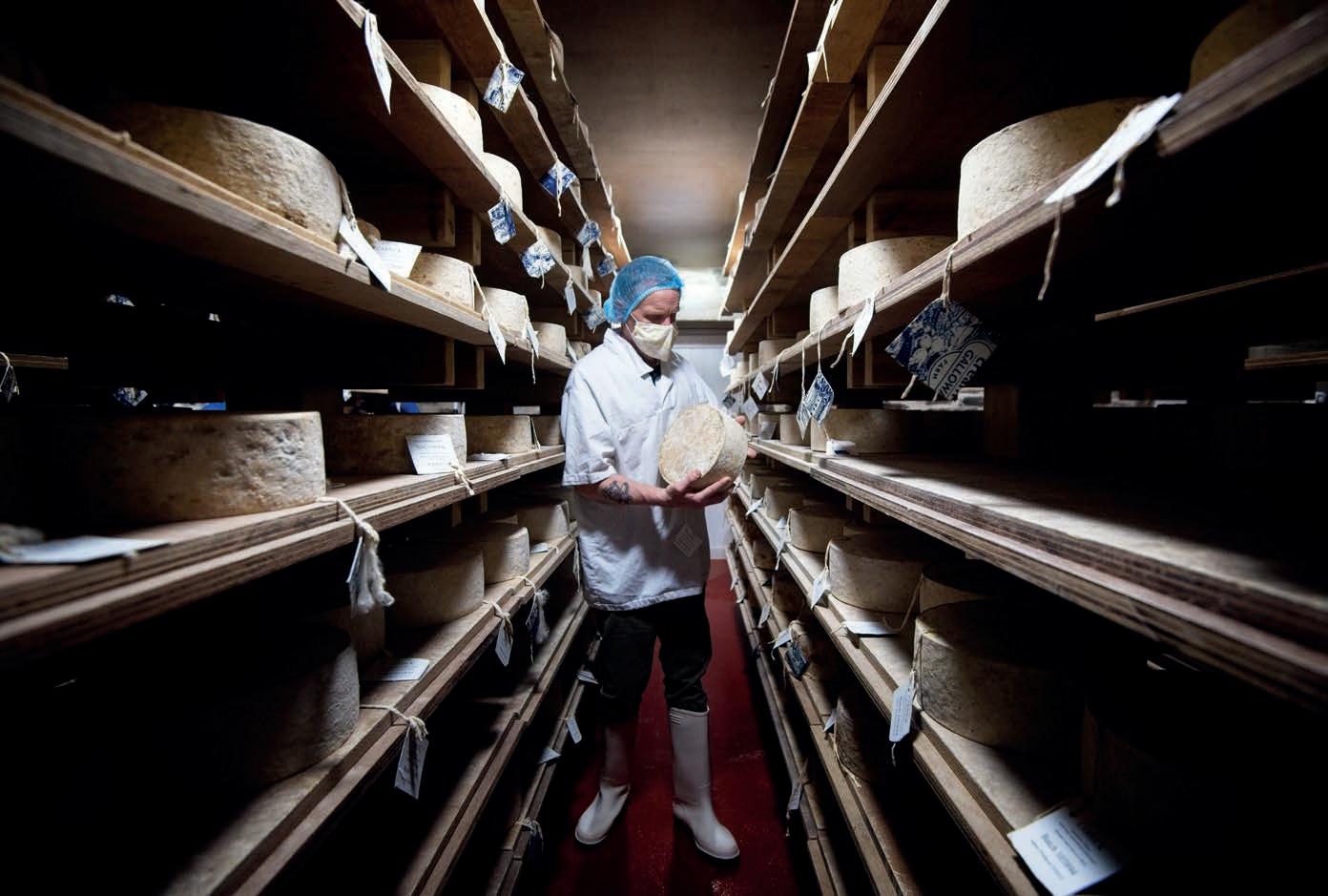
This approach provides traceability and allows the farm to retain more of the product’s value by bypassing intermediary processors and distributors. It also enables clearer communication with customers about how the products are made and the principles behind the farm’s operation.
Public engagement
Information about the business’s practices, such as welfare policies and environmental performance, is shared on its website – and the farm hosts public events and tours to further explain its methods.
Operating a cow-calf contact system isn’t suitable for all farms – and it does have financial implications. For example, maintaining calves with their mothers reduces the farm’s saleable milk output, and the organic, regenerative approach limits productivity compared to intensive systems.
The Ethical Dairy has managed to offset these trade-offs by adding value through direct sales and differentiation, says David. By focusing on a targeted customer base that considers ethical sourcing a priority, the business maintains pricing structures that support its cost model.
It seems to be working. The Ethical Dairy continues to share its experiences with the wider industry and public, contributing to the dialogue on what sustainable and ethical dairy production

might look like in the UK. It has hosted open days, published reports on its findings, and engaged with researchers and policy groups.
While challenges remain – especially in cost management, staff resourcing and maintaining animal health – cow-calf contact presents a potential alternative path for smaller-scale producers seeking a commercially viable business model.
David and Wilma Finlay wrote about their cowcalf contact system in their 2022 memoir A Dairy Story. It is being turned into a documentary film. Wilma Finlay sadly died on 30 March 2025.
“It’s a system that works well for us – but that doesn’t mean it is suitable for every farm.”
Left and below: The Ethical Dairy produces a range of traditional cheeses
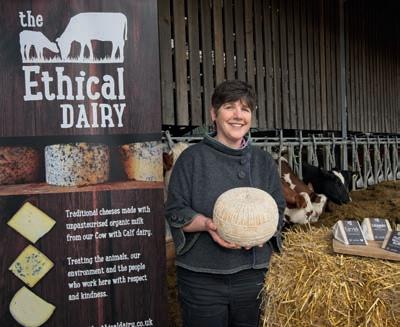

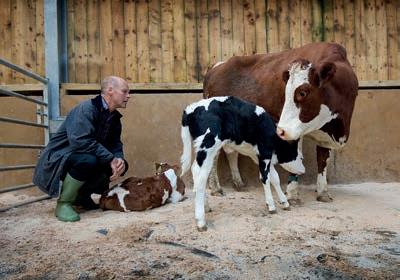
Challenges – but system has benefits too
Managing biosecurity, including challenges like Johne’s disease, is key for successful cow-calf contact systems, says Nu!eld scholar Anna Bowen.
Keeping cows and calves separate is often fundamental to control plans – and this can be challenging, she adds.
Most commercial cow-calf contact farms are currently in Nordic countries with low Johne’s prevalence. Various
management strategies are employed in cow-contact systems, including “kindergarten” areas for calves, adapted collecting yards, and different weaning methods, including gradual separation.
Robot milking systems offer a relatively easy way to manage cowcalf contact, allowing cows to access the robot while calves remain in a kindergarten or wait nearby.
“Pretty much every farmer I met on my Nu!eld said that doing it had brought them and their cows mental health benefits. So they just found it just really really nice.”
Financial modelling suggests that with careful management, the cow-calf system achieves similar profitability to conventional systems, although initial implementation may be challenging.
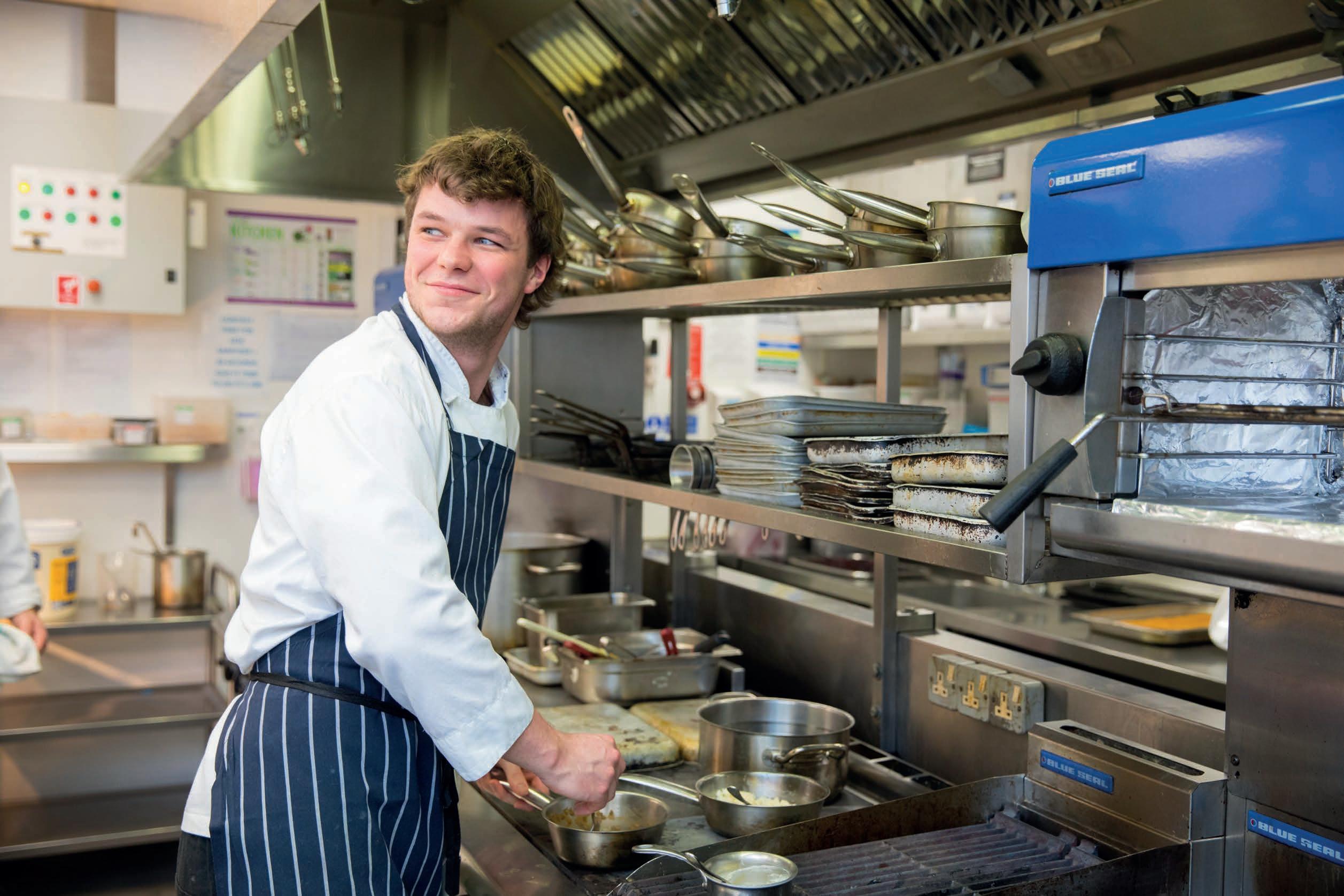
Kitchen camaraderie

Young chef Patrick Ridley is on a culinary voyage of discovery at The Farmers Club
I’ve always had a passion for food – cooking it as well as eating it. And after Chef Paul Hogben catered for a small dinner party for my 21st birthday, we discussed the prospect of me coming to do a few weeks of work experience at the Farmers Club.
I graduated from Manchester in June 2024 having studied politics. But I had already committed to taking a significant sidestep into the world of working in kitchens. By the time I attended my graduation ceremony, I was two weeks into my work experience at the Club.
Towards the end of my six weeks at the Club, Chef Paul offered me a full-time job when I returned from my travels in October. I had thoroughly enjoyed my time over the summer – and I was excited at the prospect of returning to the Club as a commis chef and becoming a permanent member of the kitchen team.
Team member
I have now been a team member for six months – eager to learn as much as I can and enjoying it more and more. I work on the garnish section in the hot food kitchen. This means I am primarily responsible for the vegetables and side dishes in all main courses.
Our kitchen is not quite what I had expected – and certainly not as noisy and chaotic as The Bear and Hell’s Kitchen on TV. We are lucky at the Club to have some extremely experienced chefs, so service runs smoothly and calmly with much less shouting than I expected.
One of the great benefits of having so many experienced chefs is that they all can take the time to teach me some tips and tricks. I particularly enjoyed being taught the correct way to make an omelette by Chef Paul. My omelettes still aren’t quite as good as his, but they have certainly improved.
One of the things I love about my job is the sense of camaraderie within the kitchen team. We all work together to give Club members the best experience we can. And at the end of the night after a busy shift, I feel an immense sense of satisfaction.
Top suppliers
I have been fortunate to meet some of the Club’s suppliers. The first of these was Aubrey Allen, one of our meat suppliers. Aubrey Allen works with only the top one per cent of all British beef – one of many reasons they have won national awards.
Sous chef Gerald Mirey and myself joined 80 or so other guests from restaurants and other businesses at Aubrey Allen’s processing centre, just outside Coventry. During the day, we were given a tour of their facility –including four enormous dry-ageing fridges.
We witnessed their small army of butchers breaking down a wide range of different animals. One of their master butchers demonstrated how they break down their beef rumps into four separate muscles, ready to be distributed across the country.
After our tour, we were treated to lunch, including samples of British charcuterie and cheese. In the afternoon there was a Q&A with special guest Alain Roux, who has recently retained three Michelin stars at the Waterside Inn at Bray, Berkshire.
Successful sta
It was a fascinating discussion. Mr Roux emphasised the need to invest time and patience when training the staff of any restaurant. Those staff are integral to the business’s chances of success. It is something we believe here at The Farmers Club too.
Overall it was an amazing day. I came away from it with a far greater appreciation of the efforts made by top suppliers to ensure a highquality product is consistently available to their customers. I also came away with a tote bag full of meat.
I have also travelled with senior chef de partie Fade Hassan to Pulborough, where Chef’s Table host classes showing how to break down a whole venison. This day consisted of a demonstration from a local chef before we split off into small groups to work on what we had been shown.
Chefs Table have made it their mission to get more venison into restaurants. They focus on whole venison because it is such a sustainable and potentially profitable animal to use. To get the best from it, chefs must have the knowledge required to break it down.
Throughout the morning, we were shown how to work with the animal. Then we were shown some ideas for dishes created using the various cuts. It was a fabulous experience.
Both Fade and I came away from it feeling far more confident in our butchery skills and eager to show them off at work.
Encouragement
These two excursions and my first six months working at The Farmers Club have been immensely enjoyable. I have learnt a lot – and been encouraged to try new things – all while being supported by an amazing group of chefs.
I am extremely grateful to The Farmers Club for the opportunities I have been given. In recent weeks, I have trialled some new dishes. Our recent Yorkshire rhubarb curry was one I presented – and I was thrilled to have it added to the combinations menu.
I am excited to see what the future holds. Being able to suggest dishes and receive constructive criticism is something I value. Advice and suggestions for improvement from other team members is something I value too. It is all helping me to become a better cook. Looking forward, I plan to go to culinary school, so I can develop my skills further. Alongside my experience at the Club, this will enable me to realise my longer term ambition to work in kitchens across the world.
A new way to enjoy dining

Our ever-evolving combinations menus are already a firm favourite with members, writes head chef Paul Hogben
We’ve always prided ourselves on our ability to cater to all tastes and preferences here at The Farmers Club –while delivering exceptional quality and variety.
Our newly introduced Combinations Menus have been a massive hit. Available Monday to Friday in the Restaurant, these menus balance sophistication and comfort, perfectly reflecting our commitment to innovate and delight the senses.
A menu for every taste
The beauty of these menus lies in their flexibility, catering to all palates and preferences. Whether you’re after a light bite or an indulgent experience, each dish offers both traditional and adventurous diners a range of flavours and textures.
Our Combinations Lunch Menu (£25) is an excellent mid-day option, with a variety of dishes highlighting the best seasonal ingredients: Soup of the Day – A simple yet satisfying starter showcasing fresh, local produce.
Welsh Rarebit & Shrimp Muffin, Pickled Samphire –
A twist on a British classic, combining rich, cheesy rarebit, succulent shrimp and refreshing samphire.
Beef Tartare, Pressed Green Apple, Horseradish & Truffled Confit Egg Yolk – A bold dish balancing the raw richness of beef with the sharpness of apple and the luxury of truffled egg yolk.
Shepherd’s Pie, Seasonal Vegetables –

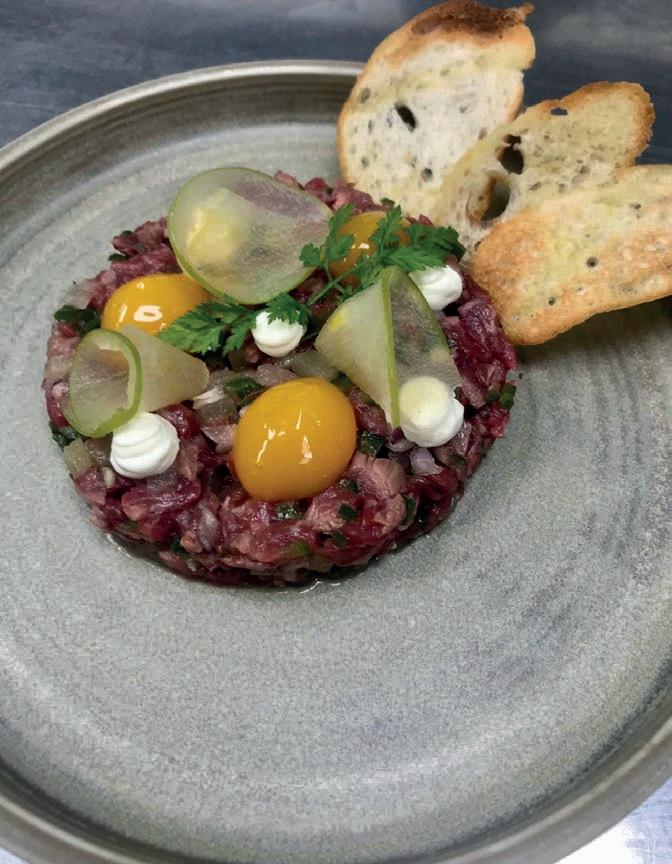
Combinations Dinner Menu (£35) perfect for those looking for a more indulgent evening experience. Dishes include:
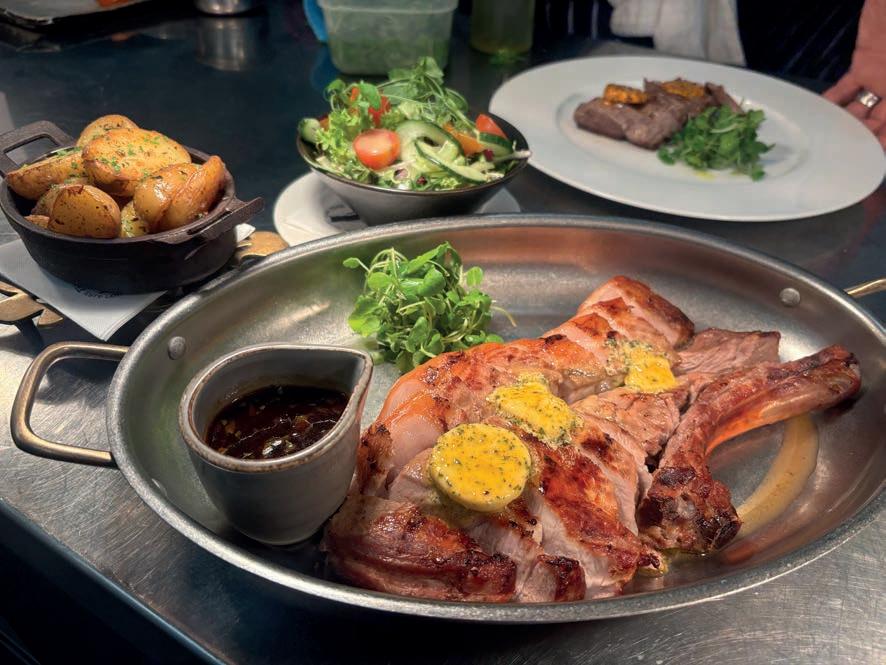
Steak Festival scheduled for May
Our recent Steak Week at The Farmers Club was a celebration of premium cuts, great company and mouth-watering flavours.
It was so popular we’ve decided to do it again – with a twist. The Farmers Club Steak Festival will take place from 12-23 May, with a diverse selection of the best quality beef, pork and lamb steaks alongside vegetarian and fish options.
This special fortnight promises to be the ultimate treat for meat lovers. It will include some truly indulgent options for diners – including rump steak, fillet on the bone, T-bone and bone-in ribeye.
But it’s not just about beef. We will also feature some special pork, lamb and fish cuts – as well as some vegetarian dishes for those wanting to try a little bit of everything. All the with right sides and sauces.
Salmon Fritter, Pea Puree, Fennel Salad – A delightful balance of crispy fritter and fresh greens.
Hanger Steak, Mash Potato, Beetroot Salad, Horseradish Cream – Tender steak with creamy mash and rich, horseradish kick – a true crowd pleaser.
Butterflied Seabass with Seasonal Vegetables, Seaweed Butter Sauce – A light and flavourful fish dish, with seasonal vegetables and seaweed butter.
Black Forest Brownie, Chocolate Mousse & Cherry Compote – A decadent dessert combining the best chocolate and cherries, perfect for a sweet tooth.
The Ever-Changing Menu also ensures that we are constantly adapting to new culinary trends and member feedback. Whether it’s adding a fresh twist to a classic dish or an entirely new combination, there’s always something exciting to look forward to.
Diverse
flavours,
a price for all
One of the most exciting aspects of these menus is the diversity of flavours on offer. The balance between traditional comfort food and modern, innovative creations ensures that each meal is always a unique experience.
Members have praised the menu for its wide range of options – from hearty classics like shepherd’s pie and beer-battered haddock to more
Each dish is crafted with the utmost care” “
contemporary choices like Black Forest brownie, and soft cheese and herb dumplings.
Our careful pricing ensures we offer something for all pockets. At £25 for lunch and £35 for dinner, the menus provide exceptional value, offering a fine dining experience without breaking the bank.
Members have especially appreciated the portion sizes and the quality of ingredients too – making it a truly worthwhile investment.
A resounding success
Feedback has already been overwhelmingly positive. Many have commented on fresh ingredients, the innovative combinations of flavours, and the carefully curated options that suit a variety of tastes.
Members have also noted the ability to enjoy a quick and satisfying lunch without compromising on quality – as well as a more relaxed and indulgent dining experience during the evening.
The diverse and changing nature of the menu means regular diners are constantly discovering new favourites. Seasonal offerings and frequent updates keep the dining experience exciting and fresh –ensuring there’s always something new to try.
So, if you haven’t already, make sure you visit us to experience the ever-changing combinations for yourself. We look forward to welcoming you.



5 special wines for Spring
Food and Beverage Manager
smooth and fresh at the same time. If you love a well-balanced red wine with depth and character, this is worth a try.
the restaurant, a decent wine list should cover it all. Here are five wines for every occasion at the Club.
1 Simpson’s White Cli s Blanc de Blancs, 2019
English sparkling wines have given the French a run for their money in recent years – and Simpson’s White Cliffs shows why. Crafted using the Great British Classic method and made of 100% Chardonnay, this Blanc de Blancs is crisp, vibrant and easy to drink.
This 2019 wine could easily convert sceptics into firm believers in English sparkling wine – and I am sure most people couldn’t taste the erence between a glass of White Cliffs and a glass of quality French Champagne. Pair it with oysters, smoked salmon – or just enjoy it on its own, you won’t regret it.

2 Chablis – Domaine Alain Gautheron, 2023
well with seafood or creamy cheeses. The region’s famous Kimmeridgian limestone goes back to the Jurassic times and brings so much influence to the wine, it is unbelievable. What always fascinates me about Chablis is how much of its character comes from the soil. doubt there is another region in the world that has a soil which dictates the wine so much.
If you ever need a reliable white wine that pleases everyone, you’ve just found one.
3 Mazzei’s Castello Fonterutoli Chianti Classico, 2021

There’s never a bad time for a glass of Chablis. This one, from Domaine Alain Gautheron, is a textbook example of why people keep coming back to this famous Chardonnay.
No heavy oak here, just pure and clean. It’s elegant, refined and it goes perfectly
One of my favourite red wines – and still unappreciated by too many people – is Chianti Classico. Mazzei’s Castello Fonterutoli Chianti Classico is made from Sangiovese grapes and packed with cherry, plum and herbal notes.
The Mazzei family have been making wine for over 400 years in Chianti, and produce anything from ordable, easy-going wines to their Super Tuscan called Seipi. This wine is absolute value for money and goes great with a steak or barbecue.
If you’re looking for a wine that brings Italy to your glass, this is it.
4 Terrazas de los Andes
Organic Malbec, 2022
Recently added to our list is this Terrazas de los Andes organic Malbec from the Mendoza region in Argentina. Their vineyards are situated 1000-1600 metres above sea level – a high altitude for wine production.
This altitude results in a fullbodied wine – as you would expect from a Malbec – but one which is
My wife, who shares my passion for wine, has a better palate than me. She was surprised to discover it is indeed a Malbec when she first tried it. She liked it so much she has also added this wine to her restaurant wine list.
5 Whispering Angel Côtes de Provence Rosé, 2023
Sitting on the Terrace and enjoying the sun, what better than to turn to a glass of chilled rose? Unless you have been stranded in space for the past five years, you must have heard about – and possibly tasted – Whispering Angel.

This Provence rosé has achieved almost cult status in many people’s opinion. It is light, crisp and dangerously drinkable. Whether you are just having a glass of wine or a light meal, you know it’s going to work well.

What some people don’t realise is that Whispering Angel is made by Chateau d’Esclans – and they make some other outstanding wine too. If you get the opportunity, try Rock Angel, it’s only one step away from Whispering Angel.
When you are in the Club next, try one of these wines. They might not be the cheapest wines on our list – but they are very reasonably priced. Most importantly they won’t disappoint. They deliver tremendous value and provide you with a wonderful wine to enjoy. And if you do fancy something else, please let me know and I will be happy to make a recommendation.
Radical reform is opportunity for landowners

Farmers hold the key to the supply of land for housing development in England, writes Nigel Salmon
Plans to stimulate the UK economy by building 1.5m new homes in five years mean big opportunities for farmers and landowners.
The government wants to boost the supply of land for housing by relaxing planning controls. Targets for local housing have already been revised upwards by many councils.
Some 63% of England’s land mass is in the hands of farmers who effectively hold the key to unlocking most of the land for new homes.
Development plans
When applying for planning permission to build houses, the starting point is always the local development plan – whether it is a district or neighbourhood plan. These plans set out where development can occur. They also contain policies against which planning applications are tested.
Landowners should promote their land when a local development plan is updated. This is because land identified for development – and allocated in a development plan – carries more weight when the council decides whether to grant planning permission.
The National Policy Framework states that where a development plan is out of date, and there is an undersupply of land in a particular area, there is a presumption in favour of permission for housing.
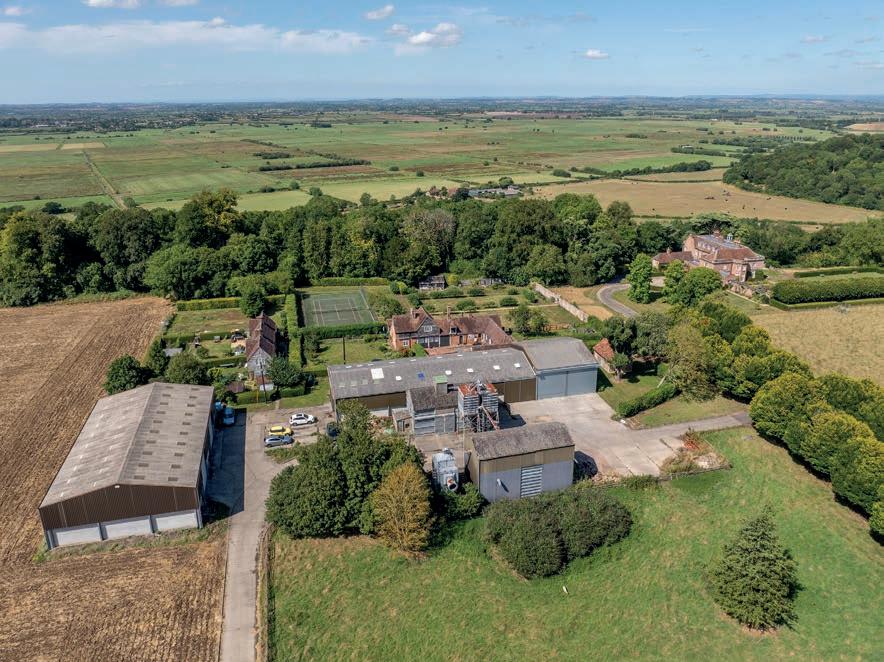
This means it is now possible to bring forward sites for development which had not previously been identified in the Development Plan. The Planning and Infrastructure Bill before Parliament will further strengthen these plans.
Permitted development
Farmers have benefitted from Permitted Development Rights to extend, erect or alter new farm buildings and other structures without full planning permission since the 1970s.
But full planning permission was still required for the change of use of agricultural buildings. This changed in 2014, when Parliament decided that planning permission would no longer be required to convert agricultural buildings for residential and business uses.
This change has presented unprecedented development opportunities for farmers where planning permission would not previously have been considered suitable by councils.
“
63% of England’s total land mass is in farmers’ hands.”
the Green Belt were partially relaxed last December. Degraded Green Belt land, known as Grey Belt, will now be allowed for housing. But this doesn’t extend to redeveloping farm buildings without a history of nonagricultural use.
It is not unusual for farm staff to occupy caravans on a farm, or for businesses to occupy farm buildings, or even for agriculturally-tied properties to be occupied by nonfarm workers, without having first obtained planning permission.
The law allows these breaches in planning control to be immune from enforcement, so long as the breach has occurred continuously for ten years or more. There are, however, some circumstances where this can be reduced to four years.
The procedure to be followed to establish lawful use is rigorous. If successful, it can unlock additional development opportunities, either by retaining the existing use or to achieve something more ambitious.
In May 2024, the government’s focus on housing growth led to further legislation to expand Permitted Development Rights for farmers, most notably the right to convert farm buildings into as many as ten dwellings. These rights apply throughout England, although not in national landscapes or for protected heritage buildings. Nigel Salmon is a Farmers Club member and managing director of Salmon Planning
Planning policy and law is extremely complex. But the government’s drive for economic growth means more openings are emerging for the farmers.
That said, it is always sensible to seek the advice of a chartered member of the Royal Town Planning Institute (RTPI) to identify and realise development opportunities that may be available.


TOWN & COUNTRY
The Farmers Club organises a wide range of events each year, including farm walks and study tours, cultural and social visits, receptions at farm shows and special events at the Club itself >>
Our calendar of activities for Spring and Summer has something for everyone. For full details about any event – and to book your place, please call Craig or Zsofia on 020 7930 3751 ext 6 or email memexpmanager@thefarmersclub.com
MAY
CHAIRMAN’S LEGAL DAY
WEDNESDAY 7 MAY
We are pleased to invite you to join Club Chairman Karen Mercer on a captivating and insightful tour that combines London’s rich legal heritage with unique, behind-the-scenes access to some of the most iconic judicial institutions in the City.
This event is an opportunity to meet key legal figures, learn about the judicial system and take guided tours of historical institutions – including the Royal Courts of Justice (45 minutes), Temple Church (60 mins) and Middle Temple (60 mins).
Delve into the heart of the UK’s criminal justice system with a tour of the Old Bailey (90 mins) as Sheri David Chalk o ers a fascinating insight into the workings of this legendary institution.
Conclude the day with an elegant reception and dinner at The Farmers Club – the perfect setting for reflection, conversation and an opportunity to discuss the day’s events with Ted Loveday, Chris Ghika, and David Chalk Cost: £80pp
This event is limited to 30 members.
PINNACLE AWARDS & DINNER
THURSDAY 8 MAY
Now in their 28th year, The Farmers Club Pinnacle Awards are a regular fixture in the academic calendar and an opportunity for students to showcase their talent.
Generously sponsored by The Cave Foundation with administration and other support given by ADAS and The Farmers Club, these awards provide students with the chance to demonstrate their potential for a career in agriculture.
Students who enter are encouraged to develop innovative, competitive and realistic business strategies that also meet the wider environmental requirements. Cash prizes are available for the winners.
POTTERY WORKSHOP
FRIDAY 9 MAY
Have you ever wanted to try pottery? Now is your chance. Our Beginner Pottery Workshop is perfect for those new to the craft. In this hands-on, 2.5-hour session, you’ll learn the basics of pottery in a friendly, supportive environment –covering everything from preparing clay to mastering the potter’s wheel.
Once completed, your pieces will be glazed and fired, ready for collection at the Club within four weeks.
You’ll learn how to prepare and centre clay; basic throwing techniques on the potter’s wheel; and texture and surface decoration techniques to personalise your own creations.

Includes a two-course lunch at The Farmers Club, transfer to and from Urban Potters, south London, and a Prosecco evening reception back at the Club.
Cost: £110pp (includes lunch, workshop, Prosecco, and firing/glazing of two pots)
BURLESQUE VS BOYLESQUE DINNER
THE FARMERS CLUB U35s HOSTS AGRESPECT
FRIDAY 9 MAY, 7.30PM
Join us for a night of glamour, entertainment, and celebration as The Farmers Club U35s proudly host a spectacular Burlesque vs Boylesque Dinner in the name of love and inclusivity.
Held in partnership with AgRespect, this dazzling event is open to all members of the LGBTQIA+ community, their friends and their allies. Prepare for an unforgettable evening filled with live performances, a mouth-watering threecourse dinner, and flowing wine.
Whether you’re drawn to the allure of burlesque or the charm of boylesque, this event promises to delight and entertain everyone. Come together to celebrate diversity, enjoy incredible entertainment, and build meaningful connections
AgRespect champions and celebrates LGBTQ+ people living, working and contributing to rural communities – values mirrored by us here at the Club.
See: www.agrespect.co.uk
Cost: £55pp (includes drinks reception, three-course dinner with wine and live entertainment).
Hidden London: ‘Access All Areas’
COMING SOON
Our ever-popular Hidden London tour series continued earlier this year with an exclusive behindthe-scenes tour of Charing Cross Station. These tours allow Club members to explore the inner workings of London’s busiest transport hubs. This tour was a journey through time, uncovering early beginnings of Charing Cross and its role in London’s ever-changing transport landscape.
A highlight was the visit to the disused Jubilee Line platforms, which have been closed since 1999. These platforms have featured in numerous films and TV shows, including Skyfall – another connection between the Club and the world of 007. This captivating series will continue throughout the year, o ering more Hidden London adventures as we delve into the secrets behind the city’s most iconic landmarks.
CARTIER EXHIBITION, V&A
TUESDAY 13 MAY
Join us as we immerse ourselves in the world of Cartier at the prestigious Victoria and Albert Museum, including a private talk by Anne Haworth followed by a twocourse lunch at The Club.
This exclusive event will give members a rare opportunity to experience the Cartier Exhibition, showcasing the brand’s iconic craftsmanship, innovative designs, and rich history in the world of luxury.
Before the exhibition, we are delighted to o er a private talk by art historian and scholar Anne Haworth. Anne will provide fascinating insights into Cartier’s legacy, delving into its cultural influence and the evolution of its design aesthetic.
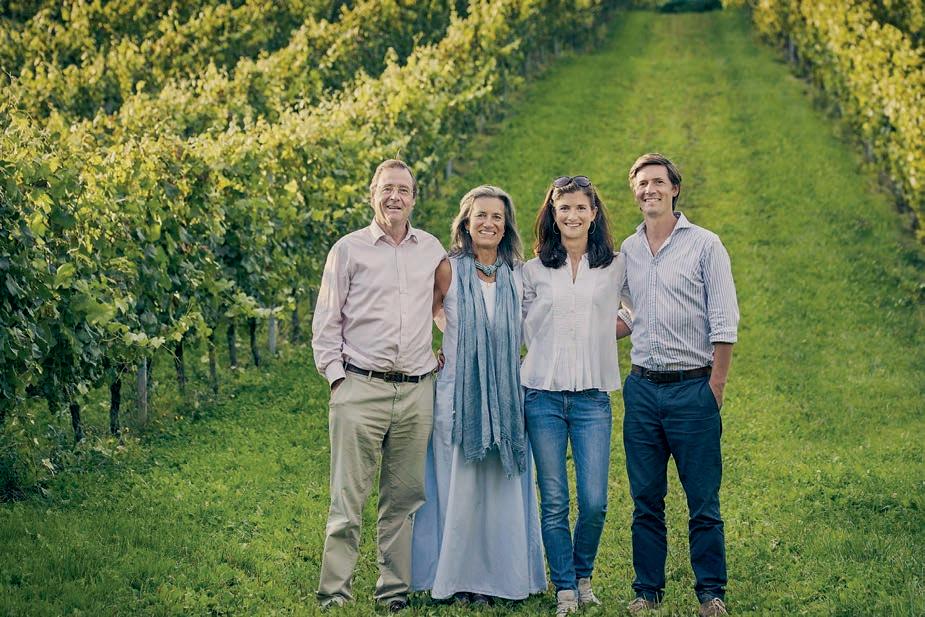
Chairman’s Farm Visits
After Anne’s talk we will enjoy a two-course lunch at the Club where Members can mingle with fellow jewellery enthusiasts and enjoy exceptional Farmers Club food.
Please note Members are requested to make their own way back to the Club after the exhibition, as we appreciate everyone will likely make their way through the show in their own time. Cost: £115 per person, which includes entry to the exhibition, a private talk on the exhibition and Cartier, a two-course lunch at the Club with wine and transfer from the Club to the V&A.
BALMORAL SHOW & PRE-SHOW DINNER
TUESDAY 13 / WEDNESDAY 14 MAY
See panel on p39
ROYAL WINDSOR HORSE SHOW
THURSDAY 15 MAY
Set against the backdrop of Windsor Castle, the Royal Windsor Horse Show is one of the UK’s premier events.
Since its inception in 1943, it has showcased top-tier competitions in show jumping, dressage, and driving. Witness thrilling displays of horsemanship, where riders and horses demonstrate remarkable skill and partnership.
Beyond the competitions, attendees can enjoy a lively festival atmosphere with shopping stalls o ering equestrian gear and artisanal foods.
The Farmers Club has reserved seating in the Castle Arena, next to the Royal Box, with a view of Windsor Castle. Cost: £180 (including £100 deposit, transfers between the Club and Windsor, and three-course dinner at the Club.
We have five special farm visits planned for this year – all carefully chosen by Club chairman Karen Mercer for the interest and insight they o er Club members.
THE WISTON ESTATE
West Sussex, Thursday, 5 June
Hosted by Richard and Kirsty Goring, whose family (pictured above) has cared for the estate since 1743. The first vineyard here was established by Richard’s mother in 2006.
Today, grapes from 12ha (30 acres) of Chardonnay, Pinot Noir and Pinot Meunier vines create the unique wines for which the estate is celebrated. Both the vineyard and winery are accredited by the Sustainable Wines of Great Britain scheme.
PX FARMS
Cambridgeshire, Tuesday, 24 June
Kindly hosted by James Peck, who has grown the farm from 300ha (750 acres) in 2003 to 5,000ha (12,500 acres) today across the four counties of Cambridgeshire, Bedfordshire, Hertfordshire and Lincolnshire.
This is ‘big farming’. The business has 51 employees, includes combinable crops, a haulage enterprise, almost 100,000 tonnes of crop storage capacity, a “crop hospital” with laboratory facility and a portfolio of rental properties and lettings.
HANLEY FARM
Chepstow, Wednesday, 23 July
Kindly hosted by Lyndon Edwards, this 240ha (600 acres) family business includes a 250-head pedigree Holstein
dairy herd, alongside 100 cross-bred Angus and Hereford beef cattle.
Livestock are pasture-fed, supplemented with home-grown crops including hay, silage, lucerne, maize, barley, peas and kale. Highly rated for health and immunity, the herd has been organic for 25 years, bred to be as trouble-free as possible.
STOCKS FARM
Herefordshire/Worcestershire
Friday 5 September
Kindly hosted by Ali Capper, this highly successful 200-year-old family farm has 40ha (100 acres) of hops (nine varieties) and 40ha (100 acres) of apples (three dessert varieties and two cider varieties).
The farm uses sustainable methods to balance profitable agriculture while caring for the environment. Hops are transported globally and supply the onsite brewery to make beer and ale. Apples are for juice and cider, including to UK supermarkets.
HARPER ADAMS UNIVERSITY FARM
Shropshire, Friday, 3 October
Kindly hosted by vice chancellor Ken Sloan, the university estate includes 307ha (759 acres) of owned land, with a further 187ha (462 acres) rented through a range of short-term tenure agreements.
Cropping is based on cereals, oilseeds, forages, maize and grassland. Livestock enterprises include a dairy herd, sheep, beef, pig and poultry units. Amenity areas include woodland, pools, water courses and stewardship sites.
To book your place on a one of our Chairman’s Farm Visits, please email memexpmanager@thefarmersclub.com
TERRARIUM WORKSHOP PRESENTED BY LONDON TERRARIUMS
FRIDAY 16 MAY
You may have noticed the beautiful mini gardens around the club, adorning tables in the function rooms and restaurant. These have proved very popular with members and guests — and now you can create your own.
In this hands-on workshop, you’ll learn about the history and science behind terrariums before designing and building your own self-sustaining ecosystem using soil, pebbles, and tropical plants such as ferns, ivy, and mosses.
By the end of the session, you willl have your very own beautiful, living terrarium to take home and enjoy for years to come.
Cost: £85 per person (includes lunch, workshop, and your 20cm x 10cm takehome terrarium)
CHAIRMAN’S TOUR OF STAFFORDSHIRE
MONDAY 19 – WEDNESDAY 21 MAY
Fully Booked – please join waitlist Embark on a memorable journey with The Farmers Club 2025 Chairman Karen Mercer, and her sons Tom, Robert, and Alec as they warmly welcome you to their scenic home county of Sta ordshire.
This exclusive tour o ers a unique chance to explore the charm of Sta ordshire, enhanced by the Mercers’ local knowledge and hospitality.
Cost: £490*, which includes two nights’ accommodation at Hilton at St George’s Park with breakfast, a black tie dinner with wine at Hilton at St George’s Park, dinner at Hall Farm, as well as all trips and catering.
See website for full Itinerary The event is limited to 60 places. * based on 2 people sharing. There will be a £300 single supplement.

Celebrate British Flower Week
MONDAY 16 – SUNDAY 22 JUNE
Nothing quite says the arrival of spring like a bouquet of flowers signalling the start of a new season.
British Flower Week is a week-long celebration showcasing the best of British-grown blooms – and promoting sustainable floristry. At The Farmers Club, we’re thrilled to be part of this annual celebration, which runs from 16-22 June.
We’re hosting a range of activities highlighting the importance of local farmers, florists and flowers themselves.
This will include a special Flower Bouquet Workshop on 16 May at The Club, where you’ll have the chance to create your own stunning display using seasonal blooms.
With sweet peas, dahlias and garden roses sourced from British growers, this two hour workshop will guide you through the art of flower arranging as you craft your own bouquet to take home.
For full details and to book your place, email memexpmanager@ thefarmersclub.com
RHS CHELSEA FLOWER SHOW
THURSDAY 22 MAY
A favourite with Members, the RHS Chelsea Flower Show is one of the world’s most prestigious horticultural events, showcasing stunning garden designs, innovative landscaping, and a vibrant array of plants.
Explore intricate displays created by top landscapers and florists, attend gardening workshops, and soak in the beauty of blooms in full display. This event is a celebration of gardening excellence and creativity, attracting enthusiasts from around the globe.
We have reviewed how this event has been run in the past and have developed an enhanced program for this coming year, starting with lunch at the Club.
This allows for a later arrival, helping members avoid the largest crowds and experience the gardens as the evening light changes and an evening aperitif.
Members will then be able to make their own way through the Flower Show at their leisure, enjoying the exhibitions and the horticultural displays.
Our tickets give members access until 8pm. Everybody to explore Chelsea Flower Show in their own time and make their way home or back to the Club afterwards. If you would like help organising your return transfer,, please let us know and we will assist.
Cost: £240 (including £110 deposit)
UNDER 35s NEW MEMBERS DINNER - INVITATION ONLY
FRIDAY 23 MAY
If you are a New U35s Member you likely will have received an Invitation in your Inbox to join us for this informal, introductory dinner with fellow newcomers as well as the current U35s Committee.
We will meeting for an informal drinks reception, followed by a twocourse dinner at the Club, where Farmers Club U35s chairman Ben Barton will welcome new members.
Come along to establish new friendships and enjoy the Club’s hospitality – making new friends while learning “how the Club works” and finding out about forthcoming events.
Cost: £15 per member (including drinks reception, three-course dinner and wine). Cancellations after 8th April will incur a 100% cancellation charge.
Dress code: lounge suit
This event is by Invitation only.
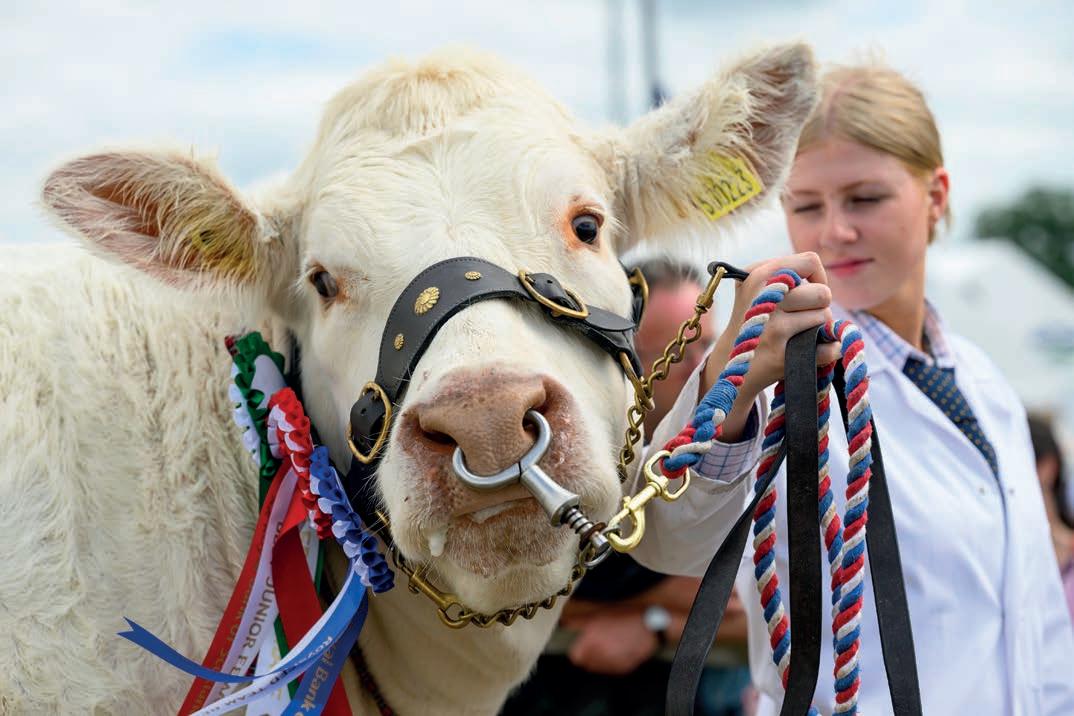
Junior Champion from the Charolais section at the 2024 Royal Highland Show with handler Jessica Hornall
Join us for our season of summer shows
Club receptions, joint receptions and dinners will be held for members and their guests at the following agricultural shows this summer:
BALMORAL SHOW
Our pre-Balmoral Show dinner will be held on Tuesday, 13 May at Queens University Belfast. Guest speaker will be Northern Ireland’s agriculture minister Andrew Muir, MLA. Club Chairman Karen Mercer and Secretary Didi Wheeler will attend the show on Wednesday, 14 May.
STAFFORDSHIRE COUNTY SHOW
Club Chairman Karen Mercer will host a joint reception with the NFU on Wednesday, 28 May. Our guest speaker will be NFU President Tom Bradshaw.
SUFFOLK SHOW
Club Vice Chairman Chris Riddle will host a joint breakfast reception with the Country Land & Business Association on Thursday, 29 May. Our guest speaker will be Archie Ruggles-Brise.
ROYAL HIGHLAND SHOW
Our pre-show dinner is at the New Club, Edinburgh, on Wednesday, 18 June. Guest speaker to be confirmed. Club
Chairman Karen Mercer and Secretary Didi Wheeler will attend the show on Thursday 19 June.
ROYAL NORFOLK SHOW
A joint reception will be held at the show on Wednesday, 25 June, with the Royal Agricultural Society of England, Worshipful Company of Farmers and Council for Awards of Royal Agricultural Societies. This promises to be an extremely popular event.
KENT SHOW
Club reception on Friday, 4 July. Guest speaker to be confirmed.
GREAT YORKSHIRE SHOW
Joint reception with Strutt & Parker on Tuesday, 8 July.
ROYAL WELSH SHOW
Joint reception with the Royal Agricultural Society of the Commonwealth on Monday, 21 July. Guest speaker: NFU Cymru Director John Mercer.
WESTMORLAND SHOW
Club reception to be held on Wednesday, 10 September. Guest speaker to be confirmed.
STAFFORDSHIRE SHOW
WEDNESDAY 28 MAY
See panel left
SUFFOLK SHOW
THURSDAY 29 MAY
See panel left
JUNE
CHAIRMAN’S FARM WALK
WISTON ESTATE, WEST SUSSEX
THURSDAY 5 JUNE
See panel on page 37
ROYAL HIGHLAND SHOW
WEDNESDAY 18 – THURDAY 19 JUNE
See panel left
U35S SUMMER DINNER
FRIDAY 20 JUNE
See page 44
CHAIRMAN’S FARM WALK PX FARMS, CAMBRIDGE (JAMES PECK)
TUESDAY 24 JUNE
See panel on page 37
ROYAL NORFOLK SHOW
WEDNESDAY 25 JUNE
See panel left
JULY
KENT SHOW
FRIDAY 4 JULY
See panel left
HENLEY ROYAL REGATTA
SUNDAY 6 JULY
See panel on page 41
GREAT YORKSHIRE SHOW
TUESDAY 8 JULY
See panel left
AGM BUFFET LUNCH & GUEST SPEAKER
TUESDAY 15 JULY
Our guest speaker for this year’s AGM bu et lunch is nutritionist Anna Taylor OBE, chief executive of the Food Foundation, which campaigns for changes in food policy and business practice to ensure everyone in the UK can a ord and access a healthy diet.

Royal Ascot – A prestigious celebration of sport and style
MONDAY 16 – TUESDAY 17 JUNE
To build excitement on the eve of Royal Ascot 2025, join us at The Farmers Club on Monday, 16 June for an exclusive dinner with distinguished guest speaker Guy Henderson, former chief executive of Ascot Racecourse.
Guy led Ascot Racecourse from 2015 to 2024, overseeing its remarkable transformation while preserving its heritage. Under his leadership, Ascot underwent significant modernisation, enhancing its comfort and luxury while increasing its global appeal.
Whether you’re attending the event with us the following day or simply a
DINNER AND HORSE GUARDS
PARADE BEATING RETREAT
TUESDAY 15 / WEDNESDAY 16 JULY
A choice of two dates to see the pomp and tradition of the Massed Bands of the Household Division merged with modern rock and pop, fireworks and explosions make for a memorable evening. Includes an early dinner at The Farmers Club.
ROYAL WELSH SHOW
MONDAY 21 JULY
See panel on page 39
CHAIRMAN’S FARM WALK
HANLEY FARM, CHEPSTOW
(LYNDON EDWARDS)
WEDNESDAY 23 JULY
See panel on page 37
fan of top-tier horse racing, this dinner provides a unique opportunity to hear from the visionary behind Ascot’s modern evolution and possibly pick up a few top tips.
If you do choose to join us at Royal Ascot itself, this year we will enjoy the races in style from our private chalet within The Village Enclosure on the Heath. This perfect location alongside the track also o ers stunning views back toward the Grandstand.
Our exclusive VIP package o ers a first-class race day experience, combining luxury with conven-ience. Guests will have exclusive admission to
AUGUST
ROYAL EDINBURGH
MILITARY TATTOO 2025
THURSDAY 14 AUGUST
Fully booked – please join waitlist Attend the spectacular world famous Royal Edinburgh Military Tattoo. Witness this time-honoured global phenomenom from the comfort of premium seats. Includes an exclusive behind-the-scenes tour and a Scottish dinner within the Edinburgh Fortress, which is itself within the walls of Edinburgh Castle. Cost: £475pp without accommodation/ transfers; £615pp including one night in a shared standard room at the Dakota Hotel Edinburgh (£100 single supplement).
The Village Enclosure and will enjoy a Pimm’s reception to kick o the day.
The package includes a complimentary bar with beers, wines, spirits, and soft drinks. Guests will also be treated to a four-course lunch with a bu et-style dessert and cheese, followed by a full afternoon tea bu et.
Racing enthusiasts can keep track of the action with racing papers and race cards. For convenience, there will be a coach transfer to and from The Farmers Club to ensure a seamless experience.
For full details and to book your place, email memexpmanager@ thefarmersclub.com
SEPTEMBER
CHAIRMAN’S FARM WALK STOCKS FARM, HEREFORD/ WORCESTERSHIRE (ALI CAPPER)
FRIDAY 5 SEPTEMBER
See panel on page 37
HONORARY MEMBERS ANNUAL LUNCH
TUESDAY 9 SEPTEMBER
The Club’s special annual lunch for honorary members typically includes a harvest prayer, a discussion of farming issues and challenges – as well as our customary social gathering with good food and wine.
WESTMORLAND COUNTY SHOW AND RECEPTION
WEDNESDAY 10 SEPTEMBER
See panel on page 39
HERCULES THE MUSICAL –GROUP THEATRE OUTING
FRIDAY 12 SEPTEMBER
A special Farmers Club visit to the Theatre Royal Drury Lane to see the musical inspired by the Disney animation. Written by Tony award winners Robert Horn and Kwame Kwei-Armah, and directed by Casey Nicholaw
GOODWOOD
REVIVAL VIA BELMOND TRAIN
SATURDAY 13 SEPTEMBER
8:40am to 9:45pm
(depart from / return to London Victoria) Join us for a joyous celebration of vintage motor racing with famous drivers and celebrity participants in the grounds of the Goodwood Estate, Sussex.
Prepare to be dazzled by classic Ferraris, Aston Martins and Mercedes Silver Arrows as they race once more. Step aboard a restored Art Deco train at London Victoria Station and immerse yourself in the charm of the 1920s.
Enjoy the comfort of an armchair with a pristine table setting while sipping a sparkling Bellini and savoring a delicious brunch as we glide through the breathtaking Sussex Downs.
As the day winds down, return to the coach by 6:00 p.m. for the journey back to Chichester Station, where the luxurious British Pullman awaits. Enjoy a glass of chilled champagne as you settle in for a seasonal three-course dinner on the train. Cost: £690pp (including £160 deposit).
FORAGING WITH FLAVOUR FRED
FRIDAY 19 SEPTEMBER
A plant and fungi foraging tour of Hampstread Heath with foraging expert George Fredenham. Tasters, nibbles, and canapes made with the wild ingredients you will see on the walk followed by dinner at the Club.
GEORGE STUBBS – ‘THE ENGLISH LEONARDO’
MONDAY 22 SEPTEMBER
Private lecture by Christopher Garibaldi, former director of the National Horseracing Museum, about self-trained 18th century English artist George Stubbs, best known for his paintings of horses.

Elegance and tradition at the Henley Royal Regatta
SUNDAY 6 JULY
First held in 1839, the Henley Royal Regatta is one of the world’s most prestigious rowing events, set against the stunning backdrop of the River Thames. A high-energy competition with refined elegance, it is an unforgettable experience.
For Farmers Club members, the regatta o ers a perfect blend of food, drink, and entertainment. Thanks to the generosity of the Copas Family, members can enjoy the exclusive Temple Island Enclosure at Fredenham Farm.
From this prime location, members and their guests can take in panoramic views of Temple Island and the regatta course – all while enjoying unparalleled hospitality provided in partnership with Ambro Events.
This exclusive event includes a private boat tour, champagne reception and four-course lunch, followed by afternoon tea with strawberries and cream. Guests also enjoy a complimentary bar including Pimms, wine, beer, house spirits and soft drinks.
U35s
JILL WILLOWS TRAINING DAY AND AUTUMN DINNER
FRIDAY 26 SEPTEMBER
Our second Jill Willows Training Day will be followed by our U35s Autumn Dinner at the Club. For a full list of other U35s events, see page 44.
CHAIRMAN’S FARM WALK
HARPER ADAMS UNIVERSITY, NEWPORT (KEN SLOAN)
MONDAY 29 SEPTEMBER
See panel on page 37
OCTOBER
HARVEST FESTIVAL SERVICE
AT ST MARTINS-IN-THEFIELDS AND CLUB SUPPER
WEDNESDAY 15 OCTOBER
Join us for our annual Harvest Festival at St Martins-in-the-Fields followed by a superb supper at the Club. A wonderful venue, the church has outstanding acoustics and stunning architecture.
NOVEMBER
MONDAY EVENING LECTURE: PETER CRAVEN
MONDAY 4 NOVEMBER
Nu eld scholar and fourth generation Lincolnshire farmer Peter Craven will talk about successful succession planning for farming families.
U35S FESTIVE DINNER & AGM
FRIDAY 28 – SATURDAY 29 NOVEMBER
The last U35s dinner of the year on the Friday will be followed by the U35s AGM Committee Social on the Saturday for committee members only.
DECEMBER
FARMERS CLUB GOLF SOCIETY INAUGURAL ANNUAL DINNER
FRIDAY 12 DECEMBER, 6.45pm
Join us for our inaugural Golf Society Dinner, hosted by captain David Rose.
Our night of fun, frivolity and golfing banter will begin with a drinks reception followed by a three-course festive meal. Members are encouraged to bring guests and enjoy the company of fellow golfers
We encourage you to extend the evening by booking a room for the Saturday night and enjoying London’s Christmas lights and spirit.
Cost: £65 pp
NEW YEAR’S EVE
BLACK TIE DINNER
WEDNESDAY 31 DECEMBER
See in the New Year from our terrace opposite the London Eye, the focal point for London’s famous firework display.
Apply for a grant from your charitable trust
A host of opportunities is available for members thanks to the Club’s charitable trust
Entries are (set to) open for two awards and bursaries from the Farmers Club Charitable Trust. Farmers Club members still have plenty of time to prepare applications for the trust’s Snapshot Studies award and Windsor Leadership Trust bursaries – both of which have an application deadline of 31 July.
Snapshot Studies
Snapshot Studies are open to individuals with innovative ideas they wish to research or develop further. This initiative offers quick access funding, with both the application and reporting processes completed via video submission.
Almost £60,000 has been distributed since the Snapshot Studies award was launched in 2022. They include projects looking at food security, real-time soil monitoring, sustainable beef production and viticulture.
Windsor Leadership Trust
The trust is also inviting members to apply a bursary to participate in the Windsor Leadership Trust scheme, which is helping to create and upskill agricultural Leaders through its development programme.
The Windsor Leadership Trust offers the opportunity for people in agriculture to step away from their daily routines and immerse themselves in an environment completely removed from farming and food production.

The organisation’s patron is Vice Admiral Sir Tim Laurence – and articipants are exposed to diverse leadership practices from sectors such as the military, clergy, charities, business, and civil service.
With over 25 years of experience in leadership development, Windsor Leadership’s roots trace back to 1981 with the establishment of the ‘Windsor Meetings,’ aimed at addressing significant societal issues.
Residential programmes are hosted at Windsor Castle and Cumberland Lodge in Windsor Great Park. The journey begins with a Part One programme, lasting between two to five days.
This is followed by a Part Two session up to six months later, designed to review and reflect on the learnings from Part One. Participants completing the programme can then continue their development through peer-topeer networking via the Farmers Club Charitable Trust Professional Forum.
For full details about awards and bursaries, visit the Farmers Club Charitable Trust website at www.tfcct.co.uk
GET IN TOUCH
W: ww.tfcct.co.uk
E: ambassador@tfcct.co.uk
T: 07879 625660
The Farmers Club Charitable Trust is a Registered Charity (Number 282811).
TRUST NEWS
Trust distributes more than £800,000
More than £800,000 in funding has been distributed by the Farmers Club Charitable Trust since it was founded almost 45 years ago.
The brainchild of the late Trevor Muddiman, the trust was initially funded by donations and covenants from Farmers Club members, These were generously matched by the late Sir John Eastwood – and the first grants were made in 1981.
Mr Muddiman’s wife Stella, who is now Patron of the Trust, very generously transferred assets from a family trust to the charity in the 1990s. Other club members and their families have also made very generous gifts to trust funds.
Nu eld U35: Supporting the Future of Farming
The trust is proud to support younger members of the Farmers Club – and help them attend the annual Nu eld Conference. This initiative, funded by a generous bequest from the estate of the late Mrs. M. Ivor-Jones, covers both conference attendance and a contribution towards travel expenses. In 2023, the award was presented to John Hunt, and in 2024, it was awarded to Marcus Webb. Entries for the 2025 award will be announced.
Plan for strategic growth and collaboration
Significant growth and development are anticipated in trust activities with well-established policies and procedures now in place.
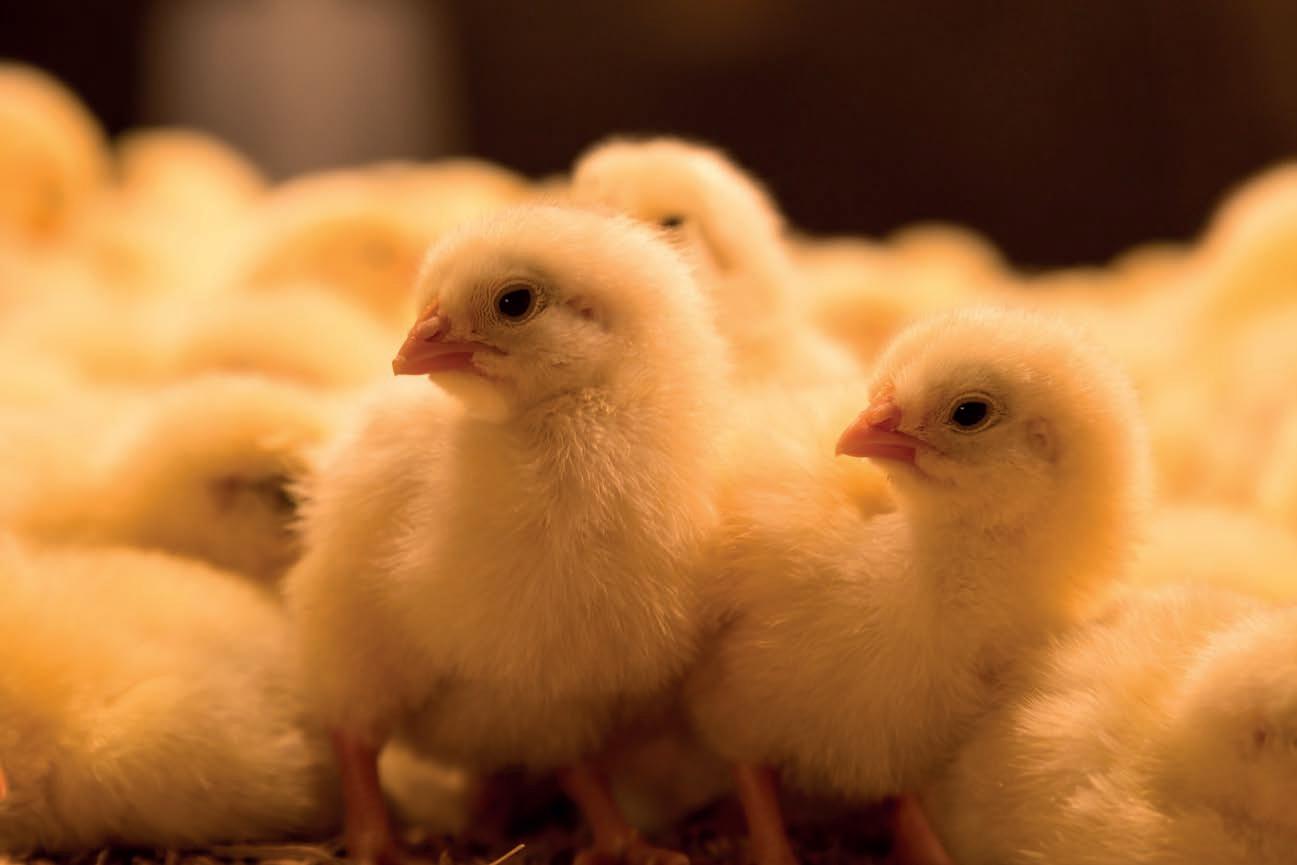
Trust chairman Nick Green continues to lead with the support of a highly skilled and experienced group of trustees. Their collective contributions have been instrumental in driving ongoing developments and strategic planning.
As income and investments increase, the organisation is wellpositioned to capitalise on these opportunities, says Nick. The trust would be pleased to hear from wouldbe supporters.

Packed fixture list for 2025
Matches and meetings are fully scheduled for months ahead, writes Martin Shaw
The Farmers Club Golf Society season is well under way with our match against XL Club at taking place on 13-14 April at Royal St George’s, Sandwich – a report of which will follow in the next Journal.
Forthcoming matches follow in quick succession at the New Zealand Golf Club in Surrey, Goring and Streatley, Luffness, Muirfield and Tadmarton Heath. All these are due to being played by 21 May – so it is a rather busy schedule.
Teams for the early season matches have already been selected, just leaving members for the BVAGS match to be finalised.
David Rose takes over the society captaincy for the next two years and looks forward to welcoming members new and old during the coming season. We are fortunate to play on such wonderful courses around the country.
There are two great matches of significance in our calendar. The first is the Club Championships at Blackwell on 21 July. This fixture has been in the calendar since the Royal Show was at Stoneleigh Park. Early indications are that this should be well supported.
The second match of note is the John Alliston Tankard Meeting between The Farmers Club and the Worshipful Company of Farmers, held annually at Stratford Upon Avon Golf Club.
This is a mixed meeting, with many players struggling to decide which side they should play for. It is important to remember John was a remarkable and well-respected character and a good friend to so many – as well as being hugely influential in agriculture.
Golfers on tour
After the disappointment of having to cancel last year’s Autumn Meeting (also a mixed event), a trip to south-west England has been organised for September, playing
golf at Trevose and St Enodoc. Numbers are limited and members attending have already paid a deposit. Those who have expressed interest will be contacted should more places become available,
The Bath Club Cup is a foursomes competition between London Clubs usually played at Woking Golf Club in early October. Our team of four usually consists of Mr Captain, the Winner of The Farmers Club Championship and guests. It is usually a great occasion, but October weather can be unpredictable.
Our last meeting of the year at Alwoodley and Seaton Carew is a two-day event. The overnight stay will be in Northallerton, hopefully including our golfing friends from the Borders.
An end-of-season social evening and dinner – suggested by John Hardman – has been arranged at the Club for Friday, 12 December. Some members and their partners have already booked, but places are still available should the opportunity appeal to spend some pre-Christmas time in London.
Any members with ideas for other fixtures, courses to play and other suggestions should please get in touch. Likewise, new members wishing to play and receive golf-related updates, should contact Martin Shaw at martin.edwardswale@gmail.com.
Matches and meetings for the season ahead
APRIL
Sunday 13th
Dinner at Royal St George’s
Monday 14th
v XL Club at Royal St George’s
Friday 25th
v EPICS at New Zealand Golf Club
MAY
Thursday 1st
v NFU at Goring and Streatley Golf Club
Tuesday 6th
v New Club at Luffness New Golf Club
Wednesday 7th
v HCEG at Muirfield
Wednesday 21st
v BVAGS at Tadmarton Heath Golf Club
JUNE
Thursday 12th
v WRNFU at Otley Golf Club
JULY
Wednesday 2nd
Club Championship at Blackwell
AUGUST
Thursday 28th
John Alliston Tankard Meet at Stratford upon Avon Golf Club
SEPTEMBER
Tuesday 9th to Thursday 11th Tour to south-west England, playing Trevose and St Enodoc golf clubs
OCTOBER
Tuesday 7th Bath Club Cup
Thursday 30th
Members and Border Golfers at Alwoodley Golf Club
Friday 31st
Seaton Carew Golf Club
DECEMBER
Friday 12th Golf Club Annual Dinner (see page 41)
UNDER 35s
U35s Diary Dates
May
Friday 9th U35s host AgRespect
– Burlesque vs Boylesque Dinner
Friday 23rd New Members Dinner (new members only)
June
Friday 6th Summer Dinner, cocktails on the terrace –Book now
Saturday 14th Gallagher
Premiership Rugby Final, Allianz Stadium, Twickenham
Saturday 21st Dinner at the New Club Edinburgh
July
Tuesday 1st Exclusive tour of Dovecote Park – Book now
Friday 25th Ceilidh at the Caledonian Club
August
Saturday 9th Box at Ascot for the Dubai Duty Free Shergar Cup, plus evening concert
Sunday 10th Inaugural tennis tournament
September
Friday 26th Jill Willows training day and Autumn Dinner
October
Friday 10th Harvest Supper, inter-club event
November
Friday 28th Festive Dinner, last dinner of the year – not to be missed
Saturday 29th U35s AGM Committee Social (Committee members only)
In the pipeline
• Tour of Lokkelebery Vineyard, Hertfordshire
• Simulated clay shooting
• Cheltenham Countryside Meet races
• Cheesemaking factory tour
• Social drinks at the Club
• Paddle tournament
All suggestions for events are welcome – whether it’s a day trip, dinner or something else entirely. No idea is too big or small. Please do get in touch.
Chairman’s jottings

WBen Barton U35s Chair
e’re just over two weeks into calving as I write this – reflecting on a long day on the farm. It’s mid-March and I’m pleased to report that – dare I say it –everything is going smoothly so far.
With the sun shining on these wonderfully spring-like days (19.5°C today), it is a joy to watch the fresh calves take their first steps outside and skip around with their mothers, all enjoying the taste of fresh grass.
We don’t have any arable here, but my father has been busy getting his spring crops in the ground between breaks in the weather. I’m sure many of you have been busy drilling, lambing or calving and I hope it has been as trouble free and successful as possible.
Special thanks
A huge thank you to the 84 lucky members who attended our New Chairman’s Dinner in February – and a special thank you as well to NFU President, Essex farmer and guest speaker Tom Bradshaw.
A big thank you too to Club Chairman Karen Mercer who joined us afterwards at the Piano Works for an evening of dancing. Karen outdanced many of us and stayed alongside those who remained until closing time.
I would also like to thank Farmers Club General Manager Roland Haimer for joining us to witness the vital role played by the U35s in Club activities. For a full insight into this wonderful event, be sure to check-out the write-up from Erin Larnder.
Fun and games
The following day a group of us headed to ‘Fair Game’ at Canary Wharf for a Saturday social and a competitive round of fun fair games. This is always a nice way to build on friendships formed within the Club while making the most of a trip to London.
Looking ahead, tickets are on sale for our Summer Dinner at The Farmers Club. Weather permitting, we will enjoy a refreshing drink on the terrace before sitting down inside to a delicious dinner with guest speaker Laurie Ibbotson, from Dovecote Park.
Tickets are also available for a tour of Dovecote Park’s flagship premises in Pontefract, which promises to be a fascinating experience. And we have just a few tickets left for the men’s Gallagher Premiership Rugby Final on 14 June at Allianz Stadium, Twickenham.
As we move towards summer and the busy season of country shows, please tell us where you’ll be heading so we can let other members know. Perhaps we can arrange a meet-up. I look forward to seeing you next time.
Ben Barton, U35s Chair 2025 T: 020 7930 3557
E: generalo!ce@thefarmersclub.com
Keep your suggestions coming
We are working hard to ensure our events provide the best value and unforgettable experiences for all our U35s members.
This year, we’re trying to offer something for everyone. We’re also working on something new and exciting – so stay tuned and keep your eyes peeled. Remember to check your emails, our social media channels, and our U35s WhatsApp group.
Many of our most successful events are those suggested by members. The sold-out Women in Agriculture Dinner was an idea from one of our U35s members, so please don’t hesitate to suggest any event ideas you may have, we do try to make them happen.
Another example is Kit Franklin’s suggestion to host a dinner at a reciprocal club. This idea stuck with me – and tickets are now on sale for our dinner at the New Club, Edinburgh, on Saturday, 21 June.
It’s an evening I’m personally very excited about – and I’m sure it’ll be a highlight of the year. Sadly, Kit will be overseas at the time, but we’ll raise a wee dram to him, and thank him for planting the seed for this event.
If you’re not receiving event emails –or would like to join the U35s WhatsApp group – please contact The Farmers Club for assistance. You can also follow The Club on social media for all our latest updates.
Inspirational speech by NFU president
A top speaker and a sold-out U35s Chairman’s Dinner brought huge numbers of members and guests to the Club on a chilly Friday evening in February, writes Erin Larnder.
Despite bitter weather outside, inside The Farmers Club was a different story entirely, as incoming U35s Chairman Ben Barton was welcomed into o!ce – with NFU president Tom Bradshaw doing an excellent job as after-dinner guest speaker.
Beginning our evening in the Bar, reconnecting with familiar friends and welcoming new ones over a drink, we knew it was a memorable night in the making – with many commenting on the popularity of the event and the buzzing atmosphere throughout the Club.
A lively dinner followed, filled with laughter, entertaining anecdotes, and engaging conversation. The evening flowed over excellent food and wine, complemented by exceptional service from the front of house staff who took very good care of us.
Wonderful evening
I would like to take this opportunity to extend a heartfelt thank you from all of us U35s to everyone involved in making this event happen. It was a wonderful evening and will live long in the memory.
Tom Bradshaw delivered a fascinating and engaging after-

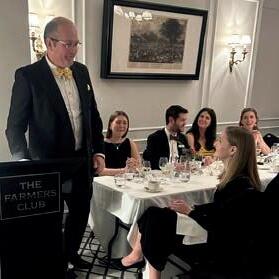
dinner address covering his life in farming, and his path into the NFU and up the ranks ahead of being elected union president in 2024.
It was inspiring to hear about Tom’s journey. He patiently answered as many questions from U35s members as time allowed for – offering his perspective on many pressing concerns within the farming community.
These included his views on the government’s proposed changes
NFU President Tom Bradshaw (left) addresses members and guests (above)
to agricultural inheritance tax, the need for better education on farming and food production within wider society, and his opinion on the key farming issues that should be prioritised over the coming years.
Thank you, Tom, for joining us for dinner, and for your time, attention and candour, which was deeply valued and appreciated.
Coats and umbrellas
Was it the end of the evening? Of course not. Undeterred by the weather – and with just enough coats and umbrellas to go around – we embarked on a journey to our next destination, an after-party at Piano Works.
A vibrant bar near Covent Garden, Piano Works is known as London’s only non-stop live music venue. It did not disappoint. Drinks flowed, the house band played a never-ending list of popular tracks and the momentum from an already excellent evening spurred us on.
Dance floor
The U35s took to the dance floor for the rest of the night, singing our hearts out to the best (and worst) of the 80s, 90s and 00s. Rumour has it, you may have even spotted Club Chairman Karen Mercer taking a spin or two around the dance floor. Our deepest thanks to Ben Barton and the U35s committee for planning such a fantastic evening.
Success for Jill Willows Training Day
Our first Jill Willows Training Day of the year was a great success on Friday, 11 April – focusing on ways to futureproofing farm businesses.
An inspiring group of speakers was lined by by Harriet Sylvester and Emily Goldsworthy. They included highly regarded lawyer Nerys Llewelyn Jones, founder and partner at Agri Advisor, who addressed the complexity of succession.
We were also joined by David Eudall, economics and analysis director at the Agriculture and Horticulture Development Board, who gave an insightful presentation and discussed the economic prospects for UK agriculture.
Last, but by no means least, the impact of the government’s autumn announcement on inheritance tax was addressed by Sam Kirkham, partner in
the farms and estates team at chartered accountants Albert Goodman.
The Club admirably hosted our Spring Dinner that same evening. Guest speaker was Gloucestershire deer manager Warren Broad, who manages wild deer across 16,000ha and serves as head of procurement for Deerbox, a company focusing on sustainable wildlife management.

SERVING THE FARMING INDUSTRY FOR OVER 180 YEARS
A call to arms to grow our membership

Members are the lifeblood of The Farmers Club – and its very heart and soul. With your support, we can all play an active role in promoting the Club at every opportunity among our social and professional networks across the UK and beyond.
Two decades ago, the Club had over 5,800 members. Since then, membership has steadily fallen. Today, we work hard to maintain membership at just above 5,000.
I echo the desire of Club
Secretary Didi Wheeler to grow our membership – and the call to arms this requires. I am sure you agree: everyone can play their part.
In the past year, we have extended our outreach programme, engaging with members and guests at even more agricultural shows
and conferences. This year, our new Campaign Plan for Membership will help secure the Club’s future.
We encourage Members to refer friends, family and colleagues to join the Club, so they too can enjoy all the benefits of membership.
Our special Group Membership category – for senior managers and executives of agri-based businesses – has been well received and continues to grow.
Of course, there is no better recruiting sergeant than a member themselves. Each of you will have your own ideas on how to promote membership and I would be delighted to hear from you.
Jez Scholfield, head of membership T: 07881 944144 E: hdm&c@thefarmersclub.com
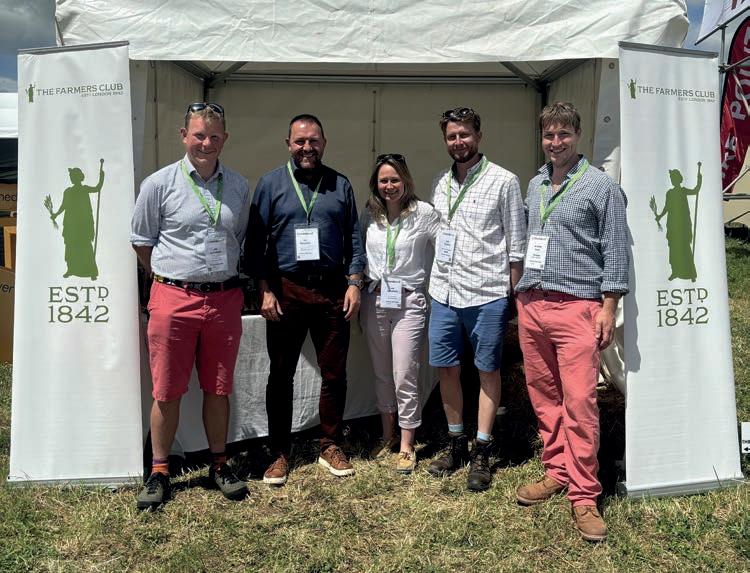
Deaths
It is with regret that we announce the death of the following members:
Mr Patrick Allen Surrey
Mr Jack Denbin Berkshire
Mrs Mary Hay Lincolnshire
Mr John Holmes OBE Su olk
Mr Peter Jackson CBE Su olk
Mr Robin Johnston Aberdeenshire
Mr Rory Lea Cheshire
Mr R McKenzie Hampshire
Mr Julian Prideaux OBE Essex
Lt Col Christopher Wells Su olk
New members
The following new members were elected:
UK
Mr IR Ashment London
Dr RM Bastow Monmouthshire
Mr JSW Brooker Kent
Mrs TMC Calvert Herefordshire
Lady C Campbell Peebles-shire
Mr SJ Clarke Sta ordshire
Mr J Coulson Cambridgeshire
Mr RK Craig Cumberland
Mr SR Drohan Yorkshire
Mr LT Entwistle Somerset
Mr HJB Eyre Devon
Mrs S Findlay Bedfordshire
Mr DA Firth Lincolnshire
Mr CJ Gasson Oxfordshire
Mr LPT Geddes Buckinghamshire
Mr C Giacomo Somerset
Mrs LT Hall Wiltshire
Mrs LJ Hart Isle of Wight
Mr FM Houseman Yorkshire
Mr CP Hughes Yorkshire
Mrs CA Jerman Shropshire
Mr OT Kingsbury Hertfordshire
Mrs JE Lea Cheshire
Mr M Mathews Hertfordshire
Dr RA McNeilly Sussex
Mr A Mercer Sta ordshire
Mr JS Morris London
Ms RM Muspratt Hampshire
Mr HDP Rankin Hertfordshire
Mr AH Riddington Lincolnshire
Ms NC Rose Warwickshire
Mrs KE Shanks Selkirkshire
Mr T Sheppard Surrey
Mrs V Spencer-Francis
Monmouthshire
Dr CN Tait Northumberland
Ms RJ Tonks Cornwall
Ms CE Turner Farleigh Norfolk
Mr B Jansen van Vuuren London
Mr RPG Wilson Perthshire
Mrs OMR Winning Cheshire
Mr AOR Wynne Leicestershire
Mr DRJ Young Leicestershire
Mr MF Young Lincolnshire
Overseas
Dr A van Biljon South Africa

Mr D Gennadios Greece
U35s
Miss CCC Adams London
Miss ES Aston London
Miss HO Browne London
Mr TAY Burges-Lumsden London
Mr HP Byers Derbyshire
Mr OG Faragher Leicestershire
Miss LF Fowler Gloucestershire
Miss CA Giles London
Mr JE Giles Sussex
Miss PE Giles Sussex

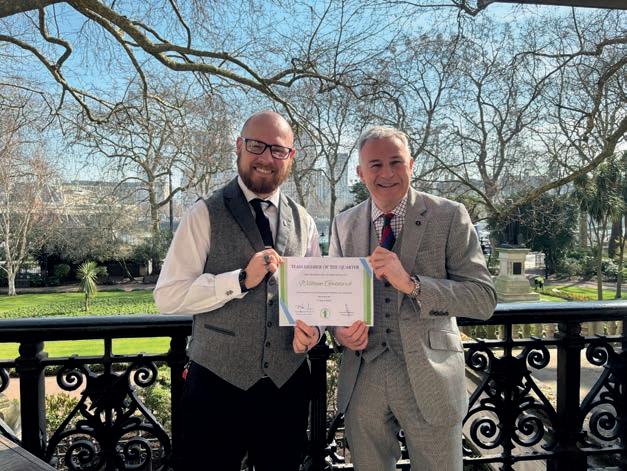
Miss A Kell Cambridgeshire
Miss JB Kittow Cornwall
Mr WT Kittow Cornwall
Mr DW Lamyman London
Miss L Law Hertfordshire
Mr CD Masters Gloucestershire
Ms B Ozyurt London
Mr HDP Rankin Hertfordshire
Mr JDC Simpson London
Mr GH Wainwright Yorkshire
Miss HZF Waugh Essex
Mrs EL Westerhuis-Wilson Hertfordshire
Mr TAH Wilkes Essex
Ms AL Wilson Durham
Mr RJ Wilson Glamorgan
U35s overseas
Mr RRE Debaecke Belgium
Mr F Schmitt-Koopmann
Switzerland
The Worshipful Company of:
Bakers Mr P Baker
Cooks Mr PV Kenyon
Coopers Mr L Johnson
Farriers Mr JF Chilman
Fruiterers Mr GE Smith
Gardeners Mrs C Peck
Poulters Mr PA Kelly
Woolmen Mr DA Hopkins
Clockwise from above: William ‘Billy’ Goddard (left) with Club Secretary Didi Wheeler; Joanna Lasinski; Alfred Lawson; and James Elmer
Meet your Farmers Club team
Please welcome our new team members – and celebrate our special milestones too, says team manager Kusum Saha.
New arrivals
Experienced IT/AV support analyst James Elmer joined us in January, having previously spent 13 years with the British Meat Processors Association.
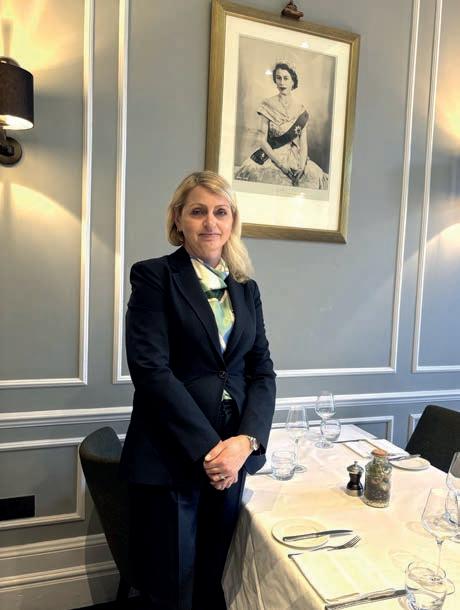
James enjoys his job because he sees the tangible results that benefit the Club across all departments. There is something special about the Club, he says, and a delight to be among kindred spirits.
Room attendant Alfred Lawson joined us from Firmdale Hotels. Well-versed in the housekeeping of top-class hotels, he is also a skilled floor polisher.
Alfred was an NHS nurse before moving into hospitality. He enjoys the Club’s working environment and its focus on continuous improvement. There is plenty of room for progression, he says.
Assistant food and beverage manager Joanna Lasinski brings extensive experience in fine dining from prestigious clubs, top-class London hotels and the House of Commons.
Joanna says she appreciates the Club’s exclusivity and unique food and drink. Having joined in February, she is already enjoying the opportunity to engage with members and provide them with exceptional service.
Leavers
We o er our gratitude for their service and extend our good wishes in their ongoing careers to George Day (front o ce manager), Lidiia Muzyka (food and beverage assistant) and Bethany Elliott (demi chef de partie).
Team Member of the Quarter
Food and beverage assistant William ‘Billy’ Goddard won our inaugural Team Member of the Quarter award, in recognition of his exceptional performance and great work.
Since joining the Club in summer 2023, Billy has become a familiar and valued member of the bar team. He has consistently demonstrated a strong sense of responsibility and steady flow of ideas for improvement.
Helpful, kind and polite, Billy goes above and beyond his duties – and an invaluable asset to the Club. Other nominees were: Fade Hassan (senior chef de partie), Vera Bykova (food and beverage assistant) and Edward Maurice (maintenance assistant).
Milestones and celebrations
We recently celebrated the 10-year service milestone of Rose Brady, our senior room attendant and rock of support within the housekeeping department.
Rose o ers invaluable guidance and training to new team members. She brings joy and laughter to the housekeeping team and all at the Club. We look forward to many more years working alongside Rose.
The Club team had a fantastic evening at The Derby at King’s Cross for our ‘Late Christmas/Early Spring Party’. Everyone enjoyed trying their luck at roulette and blackjack, with special ra%e prizes adding to the excitement. Delicious food and drinks kept spirits high – and the dancing made it a night to remember.

CLUB INFORMATION
3 Whitehall Court, London SW1A 2EL T: +44 (0)20 7930 3557 E: generalo ce@thefarmersclub.com W: www.thefarmersclub.com WiFi Password: MtVH92eE
CLUB DAILY TIMINGS
CLUB MEMBERSHIP
(18-25) 144 178 GROUP MEMBERSHIP
(£) Country (£) Bronze 466 + VAT 331 + VAT Silver 440 +
ENTRANCE FEES (£)
All categories 900 except the following: Under 35 250
Under 30 (26-29) 150 Under 30 (18-25) 100 Group 375 + VAT
CLUB DRESS CODE
(Members are always responsible for their guests)
Normal Club Dress
After 10am on Monday to Thursday, Gentlemen are to wear a formal jacket and appropriate trousers or suit and tie in all public areas of the Club. Ladies are to comply with the spirit of the code. In exceptionally warm weather, the chief executive and secretary, will allow gentlemen to remove their jackets in the Club.
Smart Casual Dress
Smart casual dress is permitted every morning, Monday to Thursday inclusive until 10am and all day on Friday, Saturday and Sunday. Smart casual dress applies throughout August. Smart Casual Dress allows members to wear long or short-sleeved full buttonfronted shirts or smart polo shirts, smart denim jeans and ‘fashion’ pumps. Smart trainers are acceptable, however, not encouraged.
Unacceptable Clothes
This includes torn, frayed, faded or bleached clothing of any type, sportswear, shorts, T-shirts, leggings and jogging suits in any material, bare midri s or excessively revealing clothing, and plastic flip flops.
Meetings & Functions
Those members and guests attending a meeting or function that has been booked with the Club Management in any of the function rooms are requested to wear a shirt with collar and a jacket (or equivalent for ladies), a tie is preferred but optional. If members and guests utilise the bar facilities, dining room, lounge or Shaw Room they are expected to adhere to rhe Normal Cress Dress code (above).
BEDROOM INFORMATION
Bedroom rates for 2025. Please see the website for rates. Members can book on-line at: www.thefarmersclub.com/accommodation
Reservations
Bedrooms may be booked up to a year in advance. For those who register via the website, you can book on-line. Specific room numbers can be requested however we are unable to guarantee these requests. There are no emergency bedrooms.
Arrival & Departure Times
Check in is 1400hrs and departure time is 1100hrs. At weekends please check in between 1400hrs & 1530hrs before reception closes at 1600hrs.
Cancellations
Members over 65 and with 20 years’ membership are entitled to a reduction to their subscription. Log into the Members Area to renew your membership details and to pay online. For membership applications, please contact Jez Scholfield at hdm&c@thefarmersclub.com
Confirmation of cancellations must be made in writing. Please note that the full room rate will be charged in the event of a cancellation being made less than 48 hours prior to arrival unless the room is re-let.
GENERAL INFORMATION
Luggage Room
This is a short-term storage facility only. In the event that luggage has been left for a period of over 3 months and we are unable to identify the owner, it will be disposed of.
Smoking & Vaping
Smoking and vaping is not allowed within the Club, but is allowed on the terrace.
Function Rooms & Events
If you are looking to book a business meeting or social event here at the Club, please contact our conference and banqueting sales manager on 020 7925 7100 or functions@thefarmersclub.com, who will be delighted to assist.

OFFICE HOLDERS
The Shaw Room (Library): The Shaw Room can be used for informal meetings of up to three people, however the door must be kept open for other members to use the room. Electronic devices may be used but must be set to silent. No calls can be received or made in this area. Calls can be made on the nearby terrace.
Business Suite: The suite is for individual private working. Meetings are prohibited. Electronic devices can be used; however, other members must be respected. Printers are available on a reasonable use basis.
Electronic Devices
No electronic devices are to be used in the hallways, bar, lounge or restaurant – unless for the purpose of quiet reading. No calls must be received nor made in these areas. Calls may be taken on the terrace.
RECIPROCAL CLUBS
The Club has reciprocal arrangements with the following clubs. Members wishing to use the facilities of the named clubs must obtain an introductory card from the General O ce (generalo ce@thefarmersclub. com) prior to their visit.
UK: City Livery Club, London (No beds); Bury St Edmunds & Farmers Club (No beds); Northern Counties Club; The New Club, Edinburgh; The Royal Scots Club, Edinburgh. Ireland: The Royal Dublin Society, Dublin (No beds); Stephen’s Green Club, Dublin. Africa: The Muthaiga Club, Kenya (temporary membership payable); The Rand Club, Johannesburgh. Australia: The Queensland Club, Brisbane; The Australian Club, Melbourne; The Geelong Club, Victoria.
New Zealand: The Canterbury Club, Christchurch; The Christchurch Club, Christchurch.
HONORARY VICE PRESIDENTS
Barclay Forrest OBE
Sir Mark Hudson KCVO
Paul Heygate OBE
THE COMMITTEE OF MANAGEMENT OF THE CLUB 2025
VICE PRESIDENTS
Nicki Quayle
Julian Sayers MBE DL
PRESIDENT AND CHAIRMAN
Karen Mercer
TRUSTEES
Tim Bennett (chairman)
John Lee OBE DL
Jimmy McLean
Keith Redpath
VICE-CHAIRMAN
Christopher Riddle
HONORARY TREASURER
John Hardman
IMMEDIATE PAST CHAIRMAN
Richard Maunder
CHIEF EXECUTIVE & CLUB SECRETARY
Didi Wheeler
CLUB CHAPLAIN
The Reverend Dr Sam Wells
COMMITTEE
Elected 2022 to serve from 2023 to 2025 inclusive: Sue Bullock (re-elected), Sarah Cowlrick (re-elected), Sophie Dwerryhouse, Nick Green (co-opted), Lindsay Hargreaves, John Wilson
Elected 2023 to serve from 2024 to 2026 inclusive: John Henning OBE, Peter Jackson, Anthony Snell (re-elected), Bill Young
Elected 2024 to serve from 2025 to 2027 inclusive: Edward Barker, Stephen Butler (re-elected), Belinda Gladwin, Tory Manuel, Tric Parrott
Co-opted: Nick Green (chairman, FCCT), Ben Barton (chairman Under 35s), Harriet Sylvester (vice chair Under 35s), Ed Whatto (Under 35s)
THE FARMERS CLUB CHARITABLE TRUST
TRUSTEES
Nick Green (chairman), Theresa Howe, Des Lambert OBE, Dr Jenna Ross OBE, James Squier, Christine Tacon CBE, Meryl Ward MBE, The Chairman and Vice-Chairman of The Club (ex o cio). Patron Mrs Stella Muddiman
TRIBUTE

Peter Jackson CBE 1927 - 2025
Engineers followed before he became a director of Lowestoft Herring Drifters in 1948, taking over as chairman when his father passed away only two years later.
He was articled to Andrew Jackson & Co, the family’s solicitor firm in Hull, before moving as a qualified solicitor in 1953 to Ellis & Fairbairn in Surrey, who dealt mostly with agricultural matters. The move to Surrey allowed him to develop his love of tennis and, of course, to marry his great love, Ann Ruffell, who he met at the 1948 Felixstowe Lawn Tennis Tournament.
Highest regard
In 1967, Peter became Company Secretary at the Milk Marketing Board, then known as Dairy Farmers of England and Wales Co-operative. Until his retirement from the MMB in 1987, he held the roles of Managing Director, Deputy Chief Executive and Special Advisor to the Chairman.
During this time, Peter was introduced to the National Federation of Young Farmers Clubs. He joined the national council and served as national President from 2000 and 2002.
Peter joined The Farmers Club in 1972. He was elected Club Treasurer briefly before being made Club President and Chairman in 1996. He became a Club Trustee and in 2002 Chairman of Trustees. In 2013, he was appointed Honorary Vice President, a position he held until his passing.
An inspirational Club President, Chairman & Trustee
For those who knew him, Peter Jackson was simply a kind and ‘such a lovely man’. Many would instantly recognise his smile, his chuckle and the mischievous twinkle in the eye.
Peter appreciated life to the full. He was blessed with a devoted and loving wife for over 67 years, nephews, nieces, godchildren and their children, all of whom he was so proud. He will be admired and remembered with affection by his family and friends for his character, warmth, generosity, humour and his undoubted ability.
Born on 9 May 1927, in Lowestoft, Peter was the only child of Harold and Joan Jackson. He attended Alderburgh Lodge School, then went up to Emmanuel College, Cambridge, to read law. The brief distraction of National Service in the Royal
Club staff held Peter in the highest regard. He showed them courtesy and gratitude at every opportunity. He was adored, not least when he and Ann were in the Club for Wimbledon fortnight.
Dedication
Retiring from the MMB, Peter became Executive Director of the British Food and Farming Year in 1989, steering a national celebration of agriculture, including a Festival of Food and Farming in Hyde Park. He was appointed Commander of the Order of the British Empire in the 1990 Birthday Honours.
Tennis dominated every decade of Peter’s life. He served the Public Schools Old Boys Lawn Tennis Association for over 60 years, making a major contribution to the development of lawn tennis. In his time, Peter was also Chairman of the Guildford Open Tennis Tournament, an active member of the Escort Squash Club, honorary member of the International Lawn Tennis Clubs of Great Britain and New Zealand and the only Englishman to be made an honorary Vice President of the Fitzwilliam Club in Dublin, and Vice President of the All England Lawn Tennis & Croquet Club. John Lee
